#I love you lesbians I love you intergenerational connections
Explore tagged Tumblr posts
Text
Listening to old lesbian women fondly reminisce about going to the same gay bar when they were young that me and my friends go to today is making me so emotional 😭
#I love you lesbians I love you intergenerational connections#it’s been open since 1933 which is so crazy
0 notes
Text
On Boston and Brian Kinney

I’ve seen a lot of folks in the Only Friends tag recently making connections between the show and Queer as Folk, both US and UK versions, which makes sense because QaF is a clear reference for the show, both visually and thematically, and we know Jojo likes to reference western media in his work. One parallel folks are drawing is not tracking for me, however, so I am jumping in the wayback machine and putting on my old QaF stan hat to talk to y’all about Brian Kinney, and why Boston is actually nothing like him. Tagging @bengiyo and @neuroticbookworm who talked this through with me and also @slayerkitty because I saw you were contemplating this connection between the two characters.
So, first, why are people making this comparison? It really boils down to one thing: Brian and Boston are both sluts. That’s… pretty much it. They both like sex and prefer to have it with many different partners, and neither has much use for monogamy. But this is pretty much where their similarities end.
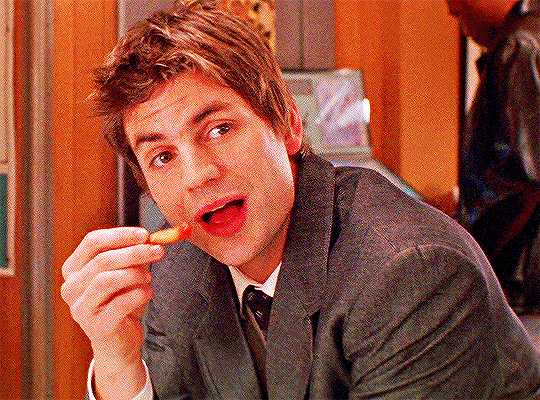
So let’s remind ourselves who Brian Kinney is: a kind of fantasy of a hot, rich, self-actualized gay man with unmatched sexual prowess and a surface level flippancy masking a heart of gold. Brian is an adult man with a thriving career and money that he earned for himself after leaving his abusive and homophobic family (who would eventually explicitly reject him because of his sexuality). As a result, he is defiant in his commitment to live his life as loudly and queerly as possible—which includes a dedication to fucking and sucking, public sex, and a rejection of heteronormative constructs like monogamy.
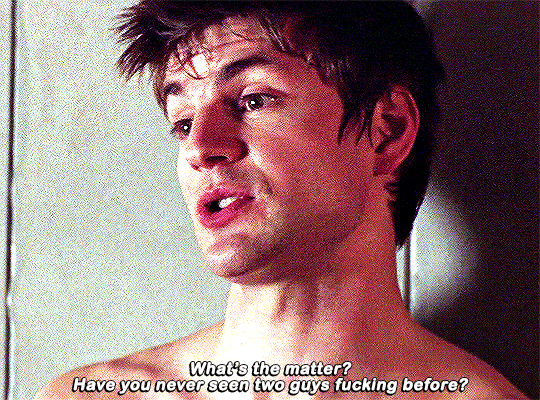
Brian has a very clear moral code he lives by, even if it’s not one most can relate to. He decides to have a son with his (lesbian) best friend because part of him wants to believe in a better future and build a family of his own. He is extremely loyal to his found family even as he’s a jerk to their face most of the time, and he is always working behind the scenes to protect them even as he often hurts their feelings with his glib remarks and shitty behavior. Despite his disdain for monogamy, he never actually tries to destroy any of his friends’ happy relationships (in fact, he tries to sacrifice his own friendship with Michael to ensure he stays with his boyfriend).
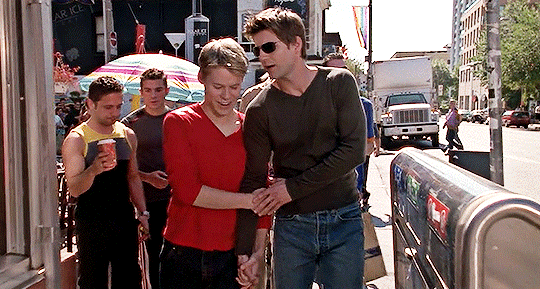
Brian has a sense of responsibility to others and often takes on the blame for things he didn’t even do, which is why he takes baby gay Justin to Debbie and ensures he is cared for even as he tries to dissuade Justin from getting attached to him, and why he cares for Justin in the aftermath of his bashing. He cares deeply about his community, to the point where he pours his money into protecting the local gay scene, literally bankrupts himself to stop an anti-gay politician from winning an election, and gives up a dream job to stay put in Pittsburgh and help rebuild the community after a hate crime.
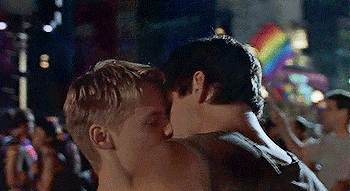
Brian is unflinchingly honest and he avoids making promises because once he does, he knows he will absolutely keep them—he takes his commitments seriously and he always does what he says he will. When he falls in love, he does not abandon his core values but he is willing to make some compromises. And he hides his better self and often wallows in self-destructive behavior because he feels deeply unworthy of love, which goes back to the intergenerational trauma he experienced as a child in an abusive home and the parental rejection he felt due to his sexuality.
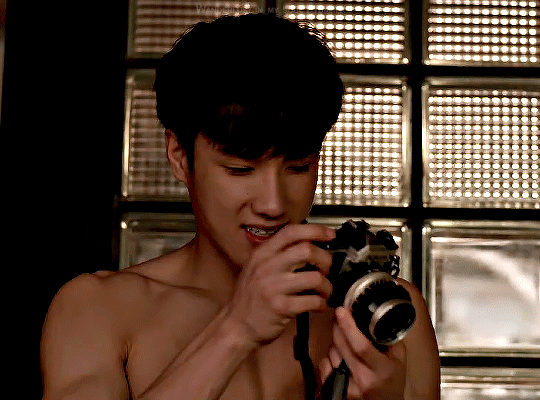
Boston, by contrast, is a character who feels more rooted in reality. He’s a pampered rich kid who is indulged in his hobbies and who already has a life plan laid out for him and paid for by his daddy. He likes to sleep around mostly because it’s fun, and because he knows his life here is temporary so he doesn’t see any point in getting attached to people. In stark contrast to Brian’s out and proud and fuck you if you have a problem with it brand of politics, he is still trying to hide who he is in service of his father’s political career, even if he’s pretty sloppy about it (see him fucking Top in a car with giant windows parked in the driveway at a house party).
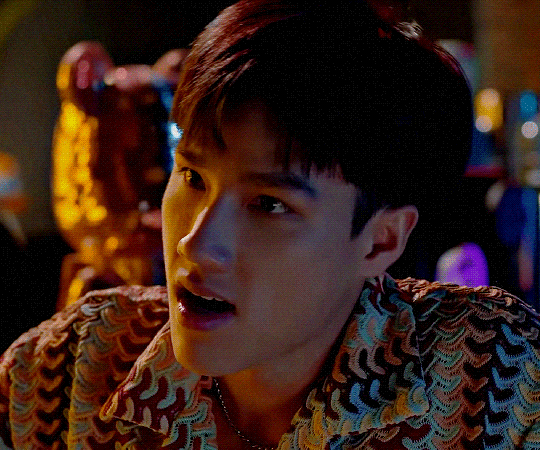
Boston’s moral code is fungible and ever-changing to fit his circumstances—boy is a hypocrite (see his opinions about people filming and photographing him even as he does the same to others constantly). He has no loyalty and no qualms about hurting and betraying his friends, and actively tries to destroy their relationships for sport or as a means to get what he wants. He does not feel responsible for anyone and often lies and ducks accountability for the things he does. He does not care about his community at all, and in fact already has a NYC escape hatch in his back pocket for when he inevitably burns his bridges. He is not as honest as Brian and sends a lot of mixed messages to keep people guessing and on the hook.
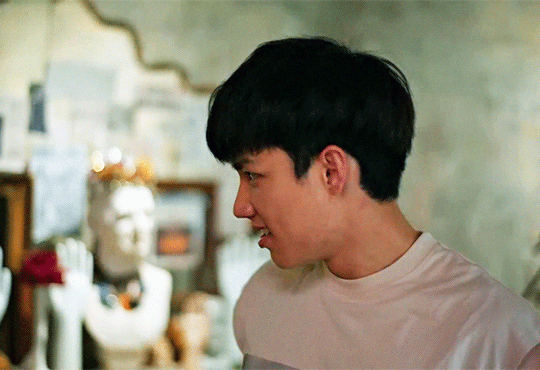
Rather than hurting people by being brutally honest as Brian does, Boston plays psychological games and manipulates his friends and lovers, and he seems to take twisted pleasure in blowing up their happiness. We haven’t seen him make a promise or fall in love, and while there are some signs that he may have some sort of inferiority complex at play (with Mew in particular), his motives are not tied to any past trauma. Boston is just a messy bitch who loves chaos and doesn’t really care who gets hurt as long as he gets what he wants and stays entertained. Where Brian is literally a superhero to his loved ones, Boston is just a very flawed human being.
But Shan, I hear you saying, I thought you liked Boston! I do, besties, I do. He’s a fantastic character and a very real kind of person many of us encounter in our 20s. Because that’s the thing: Boston is so young. He hasn’t developed any sense of responsibility to others or any understanding of the importance of queer community, and he has never had to take care of himself, which is perhaps the biggest difference between him and Brian. Brian has lived independently for more than a decade when we meet him in QaF, whereas Boston is a spoiled rich kid who has barely lived. Brian is a fully realized adult and his more nuanced characterization is a reflection of that; Boston is actually a pretty basic chaotic drama queen who will grow up eventually.
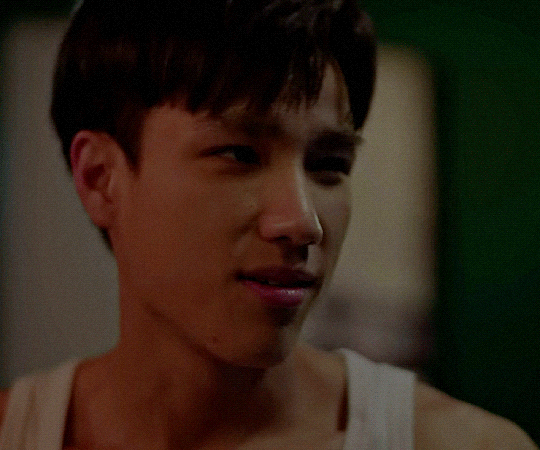
TL;DR: Aside from being promiscuous, Boston has very little in common with Brian Kinney. He is more a reflection of a very real kind of person you will meet on the scene in queer communities than an homage to a larger than life fictional QaF character. And while OF is absolutely referencing some of the themes and values and stylistic flourishes of QaF, it is not making direct parallels to its characters.
#did i write this mostly as an excuse to get brian kinney on this blog?#who can say#only friends the series#queer as folk#thai bl#ofts#only friends#ephemerality squad#shan shouts into the void
233 notes
·
View notes
Text
Love In The Big City: Reflections on the Novel, and Episodes 1 and 2 of the Television Series
(Writing this with big ups to the LITBC Book Club, led by @lurkingshan and @bengiyo -- I only wish my mom life allowed me to have participated in real time in that project! I am taking the LITBC club's lead and watching two episodes a week of this series. SPOILERS from the novel that may make their way into the series are below -- read at your peril if you're pacing yourself on the series.)
In the midst of my reading the novel version of Love In The Big City over the last two weeks, I've been posting news updates (here, here, and here) about South Korean conservatives, many of them (maybe all of them) Christian, trying to censor and prevent the airing of the subsequent drama series, which dropped this week on TVING and Viki.
I want to note how important and ironic it is, macro-systemically, to note that Christianity has such a looming presence outside of the story itself, with "protestors" (bigots) leveraging "Christian values" as a means of trying to keep this already-brilliant show from being aired.
And if you're pacing on the series like I am, and you *haven't* read the novel, then you've only gotten a little taste for how Christian zealotry, among other issues, has and will affect Go Young throughout this story.
But I'm getting ahead of myself: when I picked up the novel, I was more familiar with the noise and drama associated with the television series than I was with the story itself. I'm going to talk a little about my reactions to the novel, and then offer thoughts on the first two episodes.
I read Proust's In Search of Lost Time (yep, all of it) in my freshman year of college, and Hemingway's The Sun Also Rises two years after. I felt the power of both of these stories strongly in Park Sang-young's novel, from the impact that memories and depression can have on a young man, to the permanence of medical conditions that can drive a young man's life towards otherwise unexplored cliffs of grief and pain.
Even reading a synopsis of In Search of Lost Time is a monumental feat, so let me just say that I felt Proust's madeleine-driven devices of memory, within the novel, from Young's frozen blueberries to the chill of the Marlboro Reds in the freezer. The impact of Young being really, really alone, as connected to the empty freezer and the dwindling blueberries after Jaehee's (Mi-ae in the series) wedding, caught me in a hole of loneliness that I felt for Young -- well before I knew enough of his backstory to be truly devastated.
I'm jumping ahead of myself vis à vis the series, but I also felt Proust even more heavily as I was reading about Philosopher Hipster Doofus Hyung, and I threw back to @lurkingshan as I was reading the book, "goddamn it, we are in yet another circle of hipster doom, huh," well before I learned about the medical turning point this story hinges on. Young's incessant attraction to that POS had me thinking about Proust's narrator's simultaneous incessant attraction and disdain for his companion, Albertine, who is a lesbian in early 20th-century France. While the story between the narrator and Albertine is ultimately a devastating one, Proust's narrator winds through the devastation with an equally devastating arm's-length distance, continually avoiding the true depth of pain that his obsessions would have otherwise rendered.
For me, it's such an apropos comparison to think about as we see Young, time and time again, rationalize the avoidance he has to commitment, all while throwing his energy into the relationships he's able to find himself in, ones that he essentially stumbled upon and never instigated.
The pain of his loneliness only grows as he grows into adulthood, and that, paired with his medical reveal, left me with a boulder in my stomach by the time I finished the novel.
Because I'm me (intergenerational trauma auntie), as soon as I finished the book, I couldn't help but think about Young's own boulders that he silently shouldered -- the thought that Young's medical Kylie would rear its head as a means of aiding Young in rationalizing his own assumptions about wanting vs. deserving long-lasting love, and his habit of taking commitment too lightly, even in the context of an already-established relationship with Gyu-ho.
But I also consider the lifelong trauma he suffered vis à vis his mother as an equally heavy boulder: the fact that Young absolutely internalized his mother's disdain for him as a gay man, his mother trying to "correct" his sexuality through conversion therapy, and then seemingly seeing past her son's reality, horrifically ignoring the emotional development of her son. Besides physical abuse, you couldn't do better than Young's mother in permanently psychologically traumatizing a young man who will already face obstacles as a queer individual in a highly conservative society.
All of this combined rendered me unsurprised -- but, of course, still equally devastated -- by Young's eventually pinball-style life, jumping from menial job to increasingly flippant flings.
What we are treated to in the novel are the thoughts that Young can put together as he steps back and assesses his life, especially at the crushing end of the novel. On the surface, someone on the street could absolutely write off Young as another aloof and aging hipster, disconnected with the world; but we know that that's not the case as Young assesses his dashed hopes for the kind of permanent love that he had once pooh-poohed.
Both Proust's narrator, and Hemingway's Jake Barnes in The Sun Also Rises, could join Young in that aloofness, and our own misreads of these men, to an extent. Not only is Barnes held back in life by a previous wartime injury (to me, this is screaming of inspiration to Park Sang Young's novel and the timing of Young's medical condition, but I'll never know if Park was directly inspired by Hemingway's book), but Barnes and Proust's narrator are also both young men growing into their adulthood, within circles of friends in impactful societies that seem to be full of intelligence and engagement, but are ultimately larded with loneliness and the pain of static ambition and conformity.
The last takeaway from the novel that I'll think about for now, one that I think is already leading beautifully into the television series, is the fallacy that we all have or had as young adults: that our youth would last forever. Young says, at the end of episode two,
"As I looked down at those blueberries, I realized that a time I had thought would last forever had come to an end."
Young has to reckon with the fact that his life, as it stands still in his early 30s, hasn't moved forward. It's only gone backwards, into deep habits of disconnection, despair, and loss. That youth itself could serve as a modality of movement for a young person to hopefully grow into a person with more potential is both heartening and brutal to consider -- especially as Young clearly could not take time in his life to take care of himself, as busy with his mother as he ends up being.
There's a lot more I'll likely say about the novel as the series unwinds, but I'm honestly still internally processing it. I'm also amazed to think that both In Search of Lost Time and The Sun Also Rises have significant connections to queer sexuality in both novels, and I just couldn't help going down this comparative literature brainrot cycle for a few minutes.
As to the first episodes of the series: what can I say? No one does it like South Korea. The acting, the cinematography, what Nam Yoon-su is bringing by way of his mere presence, let alone how he bodily channels Young's sexuality and personality. We're in prestige drama territory -- and already by episode 2, we've been taking into multiple facets of Young's internal strife, and his soon-to-be-revealed lifelong aloofness to commitment, while he still yearns for infinite love.
God, those internal contradictions, huh? In our real life, with our friends who are like that -- those friends drive us INSANE, RIGHT? Proust's narrator is SO THIS. A guy who sits in a chair and whines about what he wants, and complains even more when he HAS what he wants, because it's not perfect? He HAS Albertine at so many times, but he can't make her fully love him, because guess what, she's a lesbian, womp womp? Pick a battle, homey.
And yet. We're still devastated by Proust's narrator. Because one of his ultimate flaws is that he'll never remain still, he'll never be truly satisfied, and that conflict DOES keep him from being able to attain permanent happiness. At least we get to see him age, while we're left to wonder with Young and Jake Barnes.
I'm just too excited to see how Nam Yoon-su renders Young's own conflicts, as they simply grow, throughout his life in the series.
*****
I want to make one quick, totally unrelated note, about the airing of this series. At least to me, maybe only to me, the opening animated title cards of LITBC are really close to the imagery and symbolism of the title cards of Netflix Japan's The Boyfriend, a recent dating reality show featuring gay men in Japan trying to find permanent love. The ultimate pairing of DaiShun has been HUGE in Asia this year, with DaiShun doing fan meets across Asia, including in South Korea.
As @lurkingshan and others have emphasized: Love in the Big City is NOT a BL, it is NOT a romance. It is a deep exploration of the life of a gay man in the city of Seoul.
Inspired in part by Sex And The City? Probably. But LITBC is not nearly as flippant as SATC regarding social obstacles that its main characters face. LITBC delves painfully into the various obstacles that queer men face in Seoul, from social to medical discrimination.
The Boyfriend actually touched a lot on these obstacles as well. Some of the participants were out, but not all of them; one participant, Tae-heon, used the show itself as a means of coming out to his parents.
While some of us have seen the majority of queer content in Thailand turn very primarily towards BL romances, I still believe that Thailand can and will produce high-caliber media about queer life aside from romance, as it did in 2022's The Miracle of Teddy Bear (which I just finished this week, I'm fine, thanks for asking, devastated actually) and in other cinematic pieces. But I also want to note how incredibly refreshing it is to see Japan and South Korea also pick up this thread through The Boyfriend and LITBC, respectfully, producing content out of the usual romance loops that we've come to expect from BL media.
Anyway. If there's a connection between LITBC and The Boyfriend, with both entities talking MUCH more about holistic queer life in society, then I celebrate it, and I want more, more, more of it.
#love in the big city#love in the big city the series#litbc book club#what up book club members i didn't follow any prompts but i hope you enjoy this piece and that it made sense!#the boyfriend#park sang young
47 notes
·
View notes
Note
i am 24, from chicago and i have a crush on youuuu
You are very sweet to tell me and this is my opportunity to talk about how healthy internet personalities or "celebrity" crushes are to young lesbians finding thier own sexuality in a world that mostly assumes people straight (becuase statisically that is objectively true).
I still, to this day, remember, as a teen and young woman having a crush on Christy McNichol, Nancy McKeon (or more particularly her character Jo), and Tatum O Neal. There were older women like Markie Post and Erin Gray who I crushed on. "Ooo older women, they are so steady and have their shit together .. and HOT". I actually knew very little about them off screen. My Teen magazines were featuring TEEN stars, for good reason.
But I still crushed on them and watching thier sitcoms. Most of these women were straight but that was not really important. What was important was they were not really real. I could build them to be how I want to be in my mind using the superficial things I could see about them or learn from little interviews etc.
The internet has changed that dynamic slightly. I am accessible. Reachable. A real person. I wonder if someday media experts will refer to"CowboyJen" as a character I created. They would be wrong but I would understand the thought process. There are aspects of my life I don't share. No one wants to see me ass dragging at 10 pm after a 15 hour shift sitting on my bed trying to untie my shoes before I fall asleep or cleaning my bathroom . My life is entwined with others and I protect their privacy unless they agree to participate.
I do answer DM's. I do respond to comments. I am not simply a character on a small screen that does not interact with the audience. That is a shift in the "celebrity" paradigm. And it can make crushes seem much more real.
What I want to address is that crushes and fantasizing about other women IS NORMAL and healthy and a tool to help us figure what we like, learn to enjoy our sexuality. I remember feeling shame for thinking about these women because it was "dirty" and "creepy". In reality it was no such thing. It is just a normal part of being human, to seek out a safe outlet for fantasy, day dreaming and forming our dislikes and likes in our own head and heart so we can translate that to our real dating/love life.
Crushes don't stop at the teens or 20's. I would argue most adults experience crushes as well and it is just another tool in our humanity that we use to navigate the world we live in.
The largest difference is my generation's crushes were relatively unreachable. Fan mail was mostly answered by an employee or a hired service. Any contact in real life with back stage passes or "meet and greets" were heavily controlled and monitored for safety and to protect the image of the celebrity. And also to often to prevent the musician or actor from over stepping his/her bounds too.
Now many smaller scale recognizable people are accessible in real life. We live and work in our communities. I didn't create a character I just share my life and my reality because I think it can truly give other lesbians and women hope that we are not destined to life of stereotypes because we are butch, or lesbian, or bi or female or not rich or any number of things that get false expectations attached to it.
I guess what I am saying is your crush is healthy and normal and I would never shame anyone for having such feelings towards me. It is also my duty as a role model to not breech appropriate boundaries and I take that job very seriously. The fact is I travel to Chicago on occasion and I am out and about in the real world so the chances of me meeting followers like you and and others is highly likely at some point. I love meeting people and often to respond to and meet followers, who become my friends, in person. We are all people and I am dead serious about forming intergenerational lesbian connections in real life.
Your crush is your safe place to explore emotions and attractions so enjoy.
Side note: I don't not consider myself a "celebrity" LOL I am using that word in the broad sense as meaning a recognizable person outside of my in-person friends and community.
162 notes
·
View notes
Note
Hi miss butchpeace! Id like to ask for some advice, if thats okay. So Im dating this girl. We have been friends forever, shes has been my best friend for years and after a few months of heavy romantic tension we have decided to start dating a few weeks ago. Everything is great, shes everything i love in a person and she makes me feel great too and understands me more than anyone.
The problem is that we live in a really gendie positive place, and having radfem or even radfem adjacent views is basically like commiting social suicide. And so, i have been concealing my opinions on the gender ideology for the sake of my peace and because we have some trans men on our life. Recently, my gf came out to me as nonbinary. Now i KNOW this is because she has an story of body dysmorphia and self hating. Shes also kinda androgynous and loves the style of many nonbinary people online. She said she doesnt feel like a woman because shes more aligned to that part of the gender spectrum, and that also eventually she would like to take testosterone and get a mastectomy.
I really really dont know what to do. I do love her a lot and i hurt seeing her hating her body so thoroughly to the point of wanting to do this. Every time ive tried to debate even the slightest aspect of the gender ideology ive been kinda shut down and, because im afraid she would hate me forever if she knew i think like this, everytime i just shut up and swallow whatever i want to say. It has never been that big of a problem, since the topic hardly ever came up, but now i dont know what to do with this situation and i feel so alone.
Is there some way i could approach this topic gently and in a way that wouldnt scare her? I really dont want to hurt her or lose her but i feel like i should start to be honest and stop hiding. I just want her to accept herself as she is but i feel like having this conversation with her will destroy our relationship.
That’s a really difficult situation and I feel for you! I’m sure there are other women who have been here and can chime in with their personal experiences.
I hope that since you have been friends for such a long time, that she’ll understand your viewpoint and not end the relationship over this, but sadly that could be how it turns out. Especially for young people who are caught up in all this, you’ve been taught about trans identities since you were pretty young, and I think that makes it hard for people to question it.
My advice is to try talking to her about her dysphoria, what that feels like for her and maybe get into what the cause is. Maybe talk to her about the fact that lots of masculine lesbians in older generations have struggled with dysphoria, but that they overcame it and didn’t end up transitioning. Tell her that you’ve seen older women talk about that online and that it might help her to talk to older butch women about their experiences before making these choices.
If you can find a way to connect to your local community, especially if you can find older lesbian women who aren’t as involved in the trans stuff, that could also be a big deal. Going to pride or any intergenerational meet up in your area, things like that. A huge part of what went into my transition was that I didn’t have that. I didn’t see older women who were like me and who I could see as role models.
If you can’t do that in person, try to find media that features gnc women. Whether that’s in movies or tv, books comedians, or athletes, just getting more immersed in women centered media and lesbian culture can help a lot.
I think a big thing will be talking to her about testosterone. The negative effects of it, and the fact that usually the physical changes that women want the most from it - body fat and muscle redistribution - only stay that way if you continue to take T at a high dose. It causes bad acne in a lot of women, it doesn’t really change your voice to what a normal man sounds like (it mainly just damages your vocal chords and gives you a gravelly sound), it can cause lasting reproductive issues like painful or irregular periods, hair loss can start early, and that’s all just within a short time period or on a low dose.
Basically just talking to her about the reality of what being on T means, and that it’s not going to be the fantasy that she made in her head.
I think this is a good place to start, because instead of coming across as critical of trans identity as a whole, you’re talking to her about her feelings, showing that you hear her and care about those feelings. And you’re talking about her health and what these choices will actually do for her over the long run. Remember to let her talk, and to lead the conversation without sounding like you’re judging her.
Generally, masculine women want T because they have a vague idea that it’s going to make them “more masculine”, but there’s a real lack of understanding of what that’s really going to mean in a material sense, and what it’s really going to mean in terms of how people perceive them. Mastectomy is the same way. It really changes the way that people see you and think about you. Your girlfriend will always be seen as “trans” if she does T and gets a mastectomy. That’s just how it is. And it’s important for her to understand the impact that will have on her future.
There’s no such thing as a “non-binary transition”. She’ll be seen as a medically altered female and assumed to be a trans man.
Good luck and I’m sorry you’re both going through this 🫂 I hope you come out the other side happier and with a stronger relationship than before 🌈
#feminism#lesbian#detrans#trans#radical feminism#radblr#detransition#ftm#butch#non-binary#wlw#sapphic#radfem#writing
15 notes
·
View notes
Text
Akahika can actually be something so special.
Below the cut is part 1, which goes into the literary background informing the sapphic subtext between Akane Osaki and Hikaru Koragi (3.7K words)
part 2
part 3
Akane-banashi and The Inherent Homoeroticism of a Shojo Theatre Rivalry
People have talked about Akane-banashi‘s “(homoerotic) shonen rivalry with women” but I really want to emphasize how cool it is that Akahika hits the typical shonen narrative beats AND plays into established yuri and shojo dynamics. While Akane-banashi is known to make direct references to shonen tropes(see: rakugo-quest gag), it would be short-sighted to assume the story is not informed by the history of shojo and/or yuri. We are in an era where shonen and seinen stories are sometimes indistinguishable from a "typical" modern shojo manga (why this is the case is a whole other discussion)! To examine the depth of the Akahika character dynamic, it is ESSENTIAL that we fall back to the legacy of shojo and yuri.
I will briefly give historic context on the queerness of a shojo manga rivalry, them dive into how Takarazuka theatre has influenced the queer themes explored in mainly (but not exclusively) shojo, and finally illustrate how Akane-banashi embodies both legacies through the rivalry between Akane and Hikaru.
Historians Would Call Them Shojo Rivals
There’s a long history of shojo that features rivalries between two young girls, similar to shonen manga and rivalries between two young boys. The intensity and intimacy of shojo rivalries can and often are read as homoerotic by the audience, such as the main girls from Glass Mask. Furthermore, explicitly homoerotic yuri center rivalry dynamics like Shiro to Kuro: Black and White, I’m in Love with the Villainess (inspired by historic fantasy shojo), and one series literally called Shojo Manga Protagonist x Rival-san (you can't really get more on the nose than that).
As you can imagine, yuri and shojo have a lot of overlap. This makes sense, given they also share similar origins. Anime/manga about intimate/emotionally complex relationships between two girls can be traced back to the Class S genre of the early 1900s. Class S literature (not comics. novels) usually consisted of a tragic sapphic high school romance between an underclassman and upperclassman at an all-girl's school. Girls could fall in love within, but only for that brief period of time of their youthful school years. These relationships were considered "test runs" that would be dissolved once the girls "grew up" and became real women with real husbands. While Class S eventually fell out of fashion, it went on to strongly influence future works. Influential yuri series Maria Watches Over Us has been considered the spiritual follow up to Class S, even though it began serialization in the 90s, decades after the peak of Class S. Now, nearly a century later, we still feel the influence of Class S in how queer intimacy between women is written in light novels/manga/anime.
The way that Class S and yuri make space for intimacy between women is an exercise in visualizing a more free reality for all women. Put in other words, simply allowing girls to connect with each other outside patriarchal expectations can be read as queer. This is much of the appeal of the Class S all-girls school’s setting: a contained social environment with your peers where women are not faced with the expectation to become wives and mothers just yet. We can feel this legacy of exploring womanhood and queer gender/sexuality, hand in hand, through the viral "old woman yuri" manga series Hanamonogatari (2022). Hanamonogatari shares a title with one of the most influential Class S works to be published, which was written by openly feminist and lesbian author Nobuko Yoshiya. Hanamonogatari discusses womanhood in the context of a sapphic romance, but also the importance of intergenerational solidarity between women, women forming relationships outside of the institution of marriage, and other forms of intimacy between women. Furthermore, the original Class S Hanamonogatari collection is the apparatus guiding the protagonist’s self realization of these feminist themes. The intersectional nature of Hanamongatari's depiction of feminism and lesbianism highlights how a supposedly niche sapphic genre is not any different from other stories that center women’s perspectives.
With this in mind, perhaps it is only expected that shojo, known to be written "by women, for women," would be littered with sapphic subtext. Echoing the kouhai/senpai peer dynamic of Class S, classic shojo rivalries (starting from around the 70s onwards but don’t quote me on the timeline) typically feature two young girls in the same field where the protagonist is the new, odd, up-start girl who admires her rival, a girl who usually is upper-class, considered more refined, and has an established reputation among their peers. Reined senpai might take on a mentor/older sister role with kouhai protagonist while simultaneously thwarting her progress. The protagonist is viewed as a threat to the popular girl's status/reputation, but is resolved by both girls acknowledging each other as worthy opponents. Kouhai matures in the process, senpai learns to let go a little.
The homoerotic intimacy of the shojo rivalry comes from two girls who are the only ones who seem to truly understand each other among their peers. The refined girl seems perfect on the outside, but has her own problems that are unexpectedly soothed by connecting with the new girl. The new girl is insecure about her inexperience and considered naive, but she is able to find inner strength when she is challenged by her rival, and begins to acknowledge her own worth because she is someone who can challenge their rival right back. They envy their rival, but strangely enough, feel like they can show their rival their more vulnerable moments, and perhaps even most shockingly, want to always make sure their rival brings their best selves to the competition. If the girls are rivals in both love and their careers, their respect for each other as colleagues usually trumps all else--they literally care about their relationship more than the relationship with their potential love interest. Add this in with being hyper-aware of each other's beauty, some classic "do i want to be her or stand next to her" emotional gray zone, and yeah. You get the sapphic-coded shojo rivalry.
Whether the battlefield is in love or their next career opportunity, this specific character dynamic is consistent across different story genres and time periods in shojo history: retro dramas like Candy Candy (Candy and Flanny), modern high school romance like From Me to You (Sawako and Kurumi), magical girl like Sailor Moon (Usagi and Rei) or Little Witch Academia (Akko and Diana), sports like Aim for Ace (Hiromi and Reika), or theatre like Glass Mask (Maya and Ayumi). Obviously, this isn't the case for all shojo, especially since the “love rival who exists to tear down the protagonist” character role is also very popular. The key point to grasp is that this specific rivalry dynamic continues to bring queer subtext to the forefront of shojo to this day.
There is obviously overlap with shonen rivlaries and how I'm trying to define a "classic" shojo rivalry, but there are also important distinctions ie gender roles, historic connection to exploring themes about gender/sexuality leaning into exploring queer themes, trajectory of character arcs, art language, etc that are distinct between the two demographics. Even if you don't agree with my claim that Akahika's dynamic builds off of this legacy of shojo rivalries, I want more people to start considering how simple story concepts change in execution depending on if a story is catered to male or female audience, and why those differences might exist.
Enter Stage Right, Takarazuka Revue
Shojo/yuri fanatics reading this might have noticed I side-stepped a pretty big factor that ties together Class S, yuri, and shojo, and that's the Takarazuka Revue.
Takarazuka Revue is a prestigious all-female Japanese theatre troupe known for extravagant dancing and singing performances where women are casted into strictly male or female roles. The troupe originated in the early 20th century and was founded as Japan began to adopt the cultural influence of Western theatre. Traditional kabuki theatre was already well established, but women were banned from participating (which is so crazy because kabuki was originally popularized by all-women's troupes but that's a whole other topic). Similar to how actors in kabuki troupes played both male and female roles, so too would the all-women troupe. Do not mistake this for feminist origins, however: Takarazuka Revue was established by a rich man and continues to be run by primarily men who put young women under intense work conditions comparable to the idol industry. It is meant to be palatable and profitable, and the strong adherence to male/female dichotomy reflects this.
Perhaps not-quite-so coincidentally, both Class S literature and Takarazuka Revue rose to fame at similar time points. Their popularity was so loud among young girls that they helped establish young girls as a viable target audience for marketing in popular media. In a similar vein the revue productions, Class S literature balanced depicting queerness in a way that was palatable to society (definitely less palatable than the theatre though. Class S was temporarily banned from being published for approx a decade). Furthermore, the training school established for Takarazuka girls relies on a kouhai-senpai mentorship dynamic, which naturally bleeds into the same romanticization of the underclassman/upperclassman dynamic seen among Class S school girls, modern yuri, and shojo (this isn’t to say any kouhai-senpai dynamic is gay lol but that in certain contexts, it has sapphic subtext. I also don’t want to imply causation between Class S and Takarazuka Revue because that is simply not the case. I only mean to highlight how they both impacted the cultural consciousness).
Despite attempts to emphasize the Takarazuka Revue as totally not queer, by nature of the gender-crossing acting roles, it has undeniable queer subtext. The most popular figures from Takarazuka Revue performances are specifically the actresses placed in exclusively male lead roles. Feeding into the genderqueer identity, they are expected to perform masculinity on and off the stage. The fantasy of a celebrity actress who is able to perfectly embody the "ideal" feminine and "ideal" masculine became iconic in Japanese pop-culture, especially with young female audiences (aka target shojo demographic).
The “girl prince” and/or bishonen character trope in shojo is inspired by the Takarazuka male leads. The first shojo manga, Princess Knight, features a literal girl-prince protagonist, and the author, Osamu Tezuka, cited inspiration from the revue performances he would watch with his grandmother. The legendary Rose of Versailles is another acclaimed shojo manga that based its own girl-prince character, Lady Oscar, on the Takarazuka Revue. In a whirl of serendipity, the Revue’s adaptation of Rose of Versailles would rise to be their most successful work to date, even prompting sequel productions. The adaptation would not only elevate Rose of Versailles into a franchise, but cement the Takarazuka Revue’s reputation as a prestigious entertainment company. More recently, Takarazuka Revue released a stage musical adaption of the highly acclaimed shojo manga Boys Over Flowers in 2019. Through the last ~50 years or so, the popularity and profits of shojo manga and Takarazuka Revue continue to build off of each other.
We see the influence of the Revue show up again in famous yuri relationships like Sailor Uranus (girl-prince type)and Sailor Neptune (princess type) in Sailor Moon, whose creator has also expressed inspiration from Takarazuka Revue. Another influential yuri shojo work that features inspiration from the Revue is Revolutionary Girl Utena (RGU), with again the girl prince/girl princess sapphic romance coupled with the story’s theatrics resembling a stage production. “Girl-prince” characters are also common in shojo romcoms like Monthly Girls’ Nozaki-kun and Kiss Him Not Me!, albeit as gag characters. Basically, any iteration of the pretty-boy-girl type you see in anime and manga is a downstream product of Takarazuka Revue.
The influence of Takarazuka Revue can be broadly felt across shojo covering theatre settings. On top of RGU’s girl prince/girl princess couple, there's an all-women’s theatre club that performs an interlude in nearly every episode. More recent stories like Revue Starlight (not published as shojo but had obvious shojo influences) and Kageki Shojo essentially recreate a fantasy Takarazuka Revue training school environment that’s set up as a modern take on Class S dynamics and homoerotic shojo rivalries (Revue Starlight leans more to the rivalry, Kageki Shojo leans more to the plausible deniability of Class S). Expanding the scope of theatre shojo, we can also observe classic rivalry dynamic from ballet shojo like Princess Tutu or Swan. Ballet shojo manga is actually it's own distinct shojo sub-genre that blew up starting in the 70s. Even a modern seinen (targeted to young adult men) series like Oshi no Ko develops a classic shojo theatre rivalry dynamic by having two actresses face off in a live stage theatre production, even though both of them usually act for recorded productions like movies or TV shows! That is all to say, we likely would not have the theatre rivalries between fictional women we know today without the Takarazuka Revue popularizing the idea of the stage as an ideal setting for women to explore complex relationships with each other.
Shojo-banashi
We’ve established that there is a strong precedent for sapphic-coded theatre rivalries between young women in primarily (but not exclusively) shojo manga. Where does Akane-banashi fit into all this?
To make this easy to digest, let's break down how Akane and Hikaru's dynamic compares to elements of a shojo rivalry mentioned in the first section of this post:
Senpai-Kouhai Dynamics: What's so fun about Akahika is that they are both the senpai/kouhai for different elements of rakugo. Akane is obviously more experienced in the art of rakugo, but Hikaru is more experienced as someone who is older and has an established acting career. Hikaru knew how to cater to her audience from the get-go. She came into the field already hyper-aware of how she presents herself to others. Knowing this, I think it's especially interesting how Hikaru selectively tells Akane not to use honorifics with her, but demands the opposite from Karashi. It shows that she is making an effort to be more open with Akane than her other rivals (you could argue that she does this to mess with Karashi, but again, this would show she has more of a teasing relationship with Karashi, which is distinct from her dynamic with Akane). If we are talking surface level, however, yes, Akane and Hikaru match the typical spunky young kouhai and fancy mature senpai in shojo manga, which I go into in item 2 below.
Naive Protagonist vs Refined Senior: Akane is our protagonist, and also characterized as someone who is reckless, shameless, rowdy, impulsive, etc....but notably NOT naive, which makes her distinct from the "normal girl" shojo protagonists meant to represent young femininity. Regardless, she has more youthful energy in contrast to Hikaru, who is not only older, but maintains an elegant fashion style and a professional, princess-like persona. Of course, except when she doesn't. A fun layer to Hikaru's character is that she's petty, ambitious, and competitive! Despite her appearances, she's not the type to walk off and pick the high road. Isn't it heartwarming how Akane brings out that side of her? Furthermore, despite all appearances, Akane has a sensitive side to her, as seen when she starts crying alone while grieving her loss to Hikaru/inability to win with her father's rakugo. In fact, it is because Akane inspired Hikaru to be commit to rakugo (therefore becoming Akane's senpai), and Hikaru prompts Akane to be more vulnerable, that their dynamic fits in with other Naive Protag vs Refined Senior shojo pairs, the caveat being there are many facets of their personality that exist outside of their dynamic.
The New Girl Shakes Your Worldview: Similar to point 1, this kinda goes both ways, because they are both kinda the "new girl." Hikaru immediately scopes out Akane as her competitor by accurately perceiving her strong rakugo background before even seeing her perform. But Akane doesn't truly become a rival until Hikaru has realized that Akane was on a higher rakugo level than her. It triggers her deep dissatisfaction with the trajectory of her career. Emboldened by the desire to prove herself, she decides to commit to becoming a rakugoka. Akane, on the other hand, doesn't really perceive Hikaru as a threat until Hikaru declares her own intent to beat Akane, followed by Akane experiencing her first major loss because of Hikaru. Losing to Hikaru helps cement in Akane's mind the lesson she gained during her performance, which is that it's not enough to chase her father's shadow. Both girls are able to change how they view themselves and their goals because of their interactions with each other. While Karashi also decided to pursue rakugo because of Akane, Akane has not had her view of herself shaken by Karashi. Only Akane and Hikaru have this degree of reciprocity.
Value Rivalry Over the Guy/Love Interest: Granted, I don't think Karashi was ever going to be a love interest for either of them. That said, it's interesting how the the story goes of their way to highlight how Hikaru and Karashi COULD be seen as a couple, but they definitely most certainly are NOT because Hikaru said, and I quote, "I only have eyes for you, Akane!" Hikaru prioritizes her rivalry with Akane over the perception she could be attracted to Karashi. If you haven't noticed yet, all these "classic shojo rivalry story elements" I've listed so far tend to neatly fit Hikaru more than they fit Akane (i love akane. but she definitely doesn't' act like a typical cutesy energetic kohai who needs help from her mature gorgeous senpai and cries a lot), so I also find it interesting Hikaru is so vocal about this in particular.
Next, we can examine Akahika in the context of Takarazuka Revue’s influence on yuri and shojo:
Girl prince/girl princess: I'll be frank: the bishonen character of Akane-banashi is Kaisei, and he doesn't even have anything close to the noble personality traits of a girl-prince LOL. Neither Akane nor Hikaru fit the girl-prince or girl-princess archetypes very well. However, when it comes to rakugo, the story does present them with contrasting gender presentation. Akane, inspired by her dad, proudly wears a men's kimono to every performance. When tasked with being in touch with her more "seductive feminine" side for the Fetching Tea arc, she realizes that doesn't suit her at all and adjusts her interpretation to both fit the story and her nature. This isn't to say that Akane isn't feminine, but the story repeatedly goes through lengths to show she, personally, doesn’t adhere to traditional femininity, and she doesn't have to. Hikaru, on the other hand, show a preference for more traditionally feminine things, but also seems to struggle with the pressure to always seem dignified. She's a bit of a clumsy princess. This is most apparent when Akane and Hikaru first meet, where Hikaru as a lop-sided obi knot in her women's kimono that Akane fixes for her. Akahika may not fit the glamorous Takarazuka male lead/female lead dichotomy, but their failure to do so adds to their dynamic and personal relationship with gender, so I still wanted to bring it up.
Empowered by the Character You're Cast As: This one is unique to theatre shojo and more indirectly tied to the revue. An example of how this works would be two ballerinas training to perform "Swan Lake" where one is the Black Swan, Odile and the other the White Swan, Odette. The Black Swan role pushes the dancer to be more bold, while the White Swan role pushes the dancer to be more gentle (this is also basically what happened in Yuri on Ice, a story that, wait, incorporates theatre....is gay...has bishonen men...it's almost as if-). What is important is that these roles not only prompt character growth, but present the shojo rivals as two sides of the same coin. Rakugo is obviously different since actors don't play as just one character. Still, Akane-banashi uses the stories Akahika select to build up their rivalry and character arcs during the Changing Time arc. Basically every rakugo story in Akane-banashi does something to prompt character growth in the performer, so that's already covered. What makes Akahika mirror each other in Changing Time is subtle, but no less effective at tying them together. Hikaru picks the story "Hanami Revenge," which includes the setting of watching cherry blossoms bloom. It's almost like she's stealing the "blooming cherry blossoms" in Akane's family name, Osaki, in order to pursue her revenge for the Karaku Cup (this is directly pointed out in the narration). Furthermore, Hikaru picks a story that allows her to push her voice actor training to the next level--it's a story that suits her specialties as a rakugoka. It's a story that fits her nin, which is a rakugo principle we're introduced to during this arc. Akane, on the other hand, actively chose a story suited to her father's nin, which works against her own. However, her story of choice still empowers her because it helps her connect with both her and her father's rakugo essence on a deeper level. Akane loses to Hikaru not just because she couldn't maintain audience engagement, but because as Kaisei says, "the stage isn't the place to find yourself." The Changing Time arc might not connect Hikaru and Akane as cleanly as a Black Swan/White Swan dichotomy, but I would say it accomplishes something as similar as possible for a rakugo story.
I mentioned this briefly, but it’s also important to acknowledge that Akane and Hikaru’s rivalry is written to be very distinct from Akane and Karashi OR Hikaru and Karashi. Hikaru bemoans about her chance to face Akane “in the heat of battle.” Meanwhile, Karashi begrudgingly finds himself casually hosting training events with BOTH of them, separately. Karashi spends more time outside of rakugo with Hikaru than Akane, but Hikaru shows blatant favoritism by only letting Akane refer to her without honorifics. Karashi and Akane/Hikaru are rivals who give each other advice and challenge each other to grow, yes, but they don’t create dread in each other the way Akane and Hikaru do. They don’t addrress each other’s life perspectives like Akane and Hikaru do. They don’t have the same senpai-kouhai like dynamics that Akane and Hikaru do. And, ironically enough, they don't have male lead/female lead dynamics with each other the way Akane and Hikaru do. Karashi, frankly, has way more (one sided) tension with a random side character who showed up for one chapter than he does with Akane or Hikaru. It’s very likely that side character exists just to show that he will never to have that kind of relationship with either of these girls.
Karashi fills a needed role in the girl's lives that an intimate rivalry isn’t going to give them. As someone closer in age to both Hikaru and Akane than the rest of the cast, he forms a casual intimacy with the girls that they can't get from their mentors or fellow zenza. Akane is listed as “Jugemu girl” on Karashi's phone the way an older sibling affectionately teases their annoying younger sibling. When he meets up with Hikaru, he teases her about her professional photoshoot for work. He can rile up Hikaru to the point her Fukouka accent slips out in front of him. The camaraderie Karashi has with the girls resembles what I’d expect from a secondary rival character, but lacks the theatrics (haha. theatrics) of a PRIMARY rivalry in a story. Make no mistake, Karashi is absolutely third wheeling whatever Akane and Hikaru have going on. There are in-text jokes about this.
Be honest with yourselves. When was the last time you saw all these story elements in a shonen manga rivalry with the main protagonist*? Full-stop, when was the last time you even saw a shonen manga about theatre**? You haven't, because theatre is not typically associated with shonen manga, and emotionally complex rivalries between women are also not typically associated with shonen manga. Meanwhile, theatre has appealed to shojo audiences since before shojo manga was even a thing. Intimate rivalries between women in theatre are well established in shojo manga. Shonen manga is not the only inspriation for the Akane-Hikaru dynamic! It's historically, distinctly shojo! Isn't that exciting? I think it's exciting.
That said, I have barely even BEGUN to address just how gay Akahika is in comparison to stories that ACTUALLY have sapphic romance. This is covered in part 2.
* The closer answer I would say is in Marimashita Iruma-kun. A story that also has...you'd never guess...shojo and yuri story elements…wow what a suprise...
**We don't need to mention what happened to Act-Age....And I know there's Dance Dance Danseur. But guess what. THE AUTHOR HAS WRITTEN MOSTLY SHOJO MANGA. In addition, both of these are fairly new stories from the last 10 years, which reflects how uncommon it is to talk about any form of theatre in shonen. Also that popular series about rakugo? From a josei magazine. So my point still stands.
#HAPPY THIRD YEAR ANNIVERSARY#tossing confetti in my clown makeup rn#akane osaki#hikaru koragi#akane banashi#akahika#ወሬ#shojo manga#yuri#Class S#bishonen#takarazuka revue#akahika thesis
4 notes
·
View notes
Text
Ruby

Style and substance collide in Curtis Harrington’s RUBY (1977, YouTube), with the latter, or rather lack thereof, winning. Given the wretched and derivative script — by George Edwards and Barry Schneider from a story by producer Steve Krantz — it’s a miracle Harrington accomplished anything with the film, even with strong work from stars Piper Laurie and Stuart Whitman. The film looks terrific, but what goes on within that look is hard to swallow.
The film opens in the Florida everglades in 1935 as mobsters cut down gangster Nicky Rocco (Sal Vecchio) as his pregnant mistress (Laurie) looks on in horror. Sixteen years later, Laurie is running a drive-in theatre in the area and employing the men who had killed her great love because she has a soft heart, and the script tells her to. She may have precognitive powers, as the theater is showing ATTACK OF THE 50 FOOT WOMAN (1958) seven years before it was made, but that plot line is never explored for reasons that just escape me. It’s also surprising that the isolated drive-in is constantly filled on successive nights with just that one movie playing. Anyway, Laurie’s raising her mute daughter (Janit Baldwin) with the help of Stuart Whitman, the nicest of the gangsters. She’s planning to send Baldwin to an institution, but then Vecchio’s spirit returns to kill his killers with telekinesis and possess his daughter, sometimes simultaneously (that takes a lot of spirit, and I’m here all week). So, Whitman calls in a parapsychologist (Roger Davis) who once worked as a prison psychologist, the two fields being interchangeable, to deal with the issue.
Does any of this make sense? Laurie had nothing to do with her lover’s murder, but he still seems bent on taking vengeance on her. For what? Being a better actor? He’ll have to stand in line — a very long one. The story starts out like one of those old films in which Boris Karloff plays a man who returns from the dead to get back at those who had wronged him. After the first two kills, which look rather silly thanks to the low budget, the script starts treating the murders as incidental, just so much background noise. Instead, the plot veers into THE EXORCIST (1973) territory. And for an extra kink, at one point the possessed Baldwin comes on to Laurie for a suggestion of intergenerational lesbian incest that’s just embarrassing.

For all this mess, Harrington manages to build up some atmosphere, The house and swamp are pretty impressive sets and almost become characters in the film. There’s one good, almost surrealistic sequence with a drunken Laurie wandering around the deserted drive in at night when Vecchio’s ghost starts speaking to her through the sound boxes. She’s magnetic as Ruby, a retired singer whose shot at stardom was destroyed by her mob connections, and Whitman almost matches her. But Davis, though exceedingly cute, is rather wooden, Baldwin’s performance consists mostly of making her eyes bug out, and the older gangsters are just blah. I kept trying to envision the ancient mob from Jim Jarmusch’s GHOST DOG (1999) in their place. Worse yet, at 85 minutes the film seems long, partly because it’s heavily padded with flashbacks to the opening murder and scenes from ATTACK OF THE 50 FOOT WOMAN, which you may wish you were watching after a while.

0 notes
Text
Introducing the Incoming Class
PHD/Black Mountain Institute Fellows
Domonique Conway (Nonfiction)
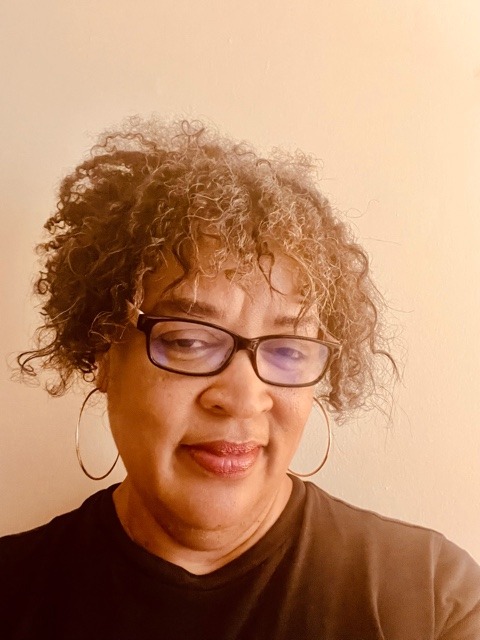
Dominque Demetrea Conway is a Baltimore-based activist and author who writes non-fiction that embodies her lived experience as a person of African descent in the United States, and a resident of West Baltimore. Born in Evanston, Illinois and raised in the nation’s rustbelt, she is the mother of four adult children. As an activist, Dominque has engaged in work addressing mass incarceration and political imprisonment in the United States. Her work with men in prisons resulted in the creation of Friend of a Friend, a prison-based mentoring program designed to teach critical thinking skills to young prisoners. Dominque has a BA from Goddard College in Plainfield, Vermont, and received an MFA from Goucher College in Baltimore in May 2021; she will pursue a Ph.D. in English at University of Nevada at Las Vegas beginning in the Fall of 2022. She is the co-author of Marshall Law The Life and Times of a Baltimore Black Panther, the memoir of Black Panther political prisoner, Eddie Conway. Her current project, Far From The Tree is a genealogical memoir examining the impact of racism and trauma on consecutive generations of her family spanning three centuries in America.
Tanya Shirazi (Fiction)
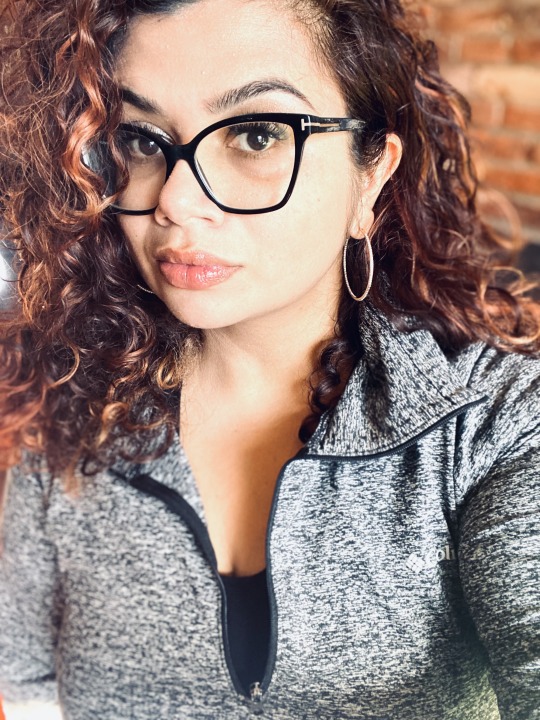
Shirazi Galvez is from Lynwood, California. She completed her undergraduate studies at UCLA, and received an MS in Counseling Psychology from Mount St. Mary's University and an MFA from the University of Pittsburgh. She is Senior Editor at Aster(ix) Journal and is working on her first novel. L.A. based, Las Vegas bound Fall 2022.
Fiction MFA
Alex Schechter

Alex Schechter is a writer and plant lover based in Los Angeles. For the last decade, he has been a professional wanderer, and he has written about his travels in National Geographic, Monocle, The New York Times, and Lonely Planet. His fiction weaves together themes of alienation, fame, the paranormal, and queer desire. He doesn't consider himself a desert person, and yet the desert keeps finding him.
Gurmehar Kaur

Gurmehar Kaur (aka Nupur Sharma) is a Radio and Online Video Broadcaster who has worked in India, the UK, Dubai and more recently the US.Her mantra in life is: Dare to Dream, Dare to Trust and on a happy day even Dare to Sing. Gurmehar’s areas of creative inquiry and work include: Indian / South Asian Literature and Cinema, New Media and Connectivity, Inter Faith Solidarity etc. Friends call her Mehar which is Persian for Affection.
Delight Ejiaka
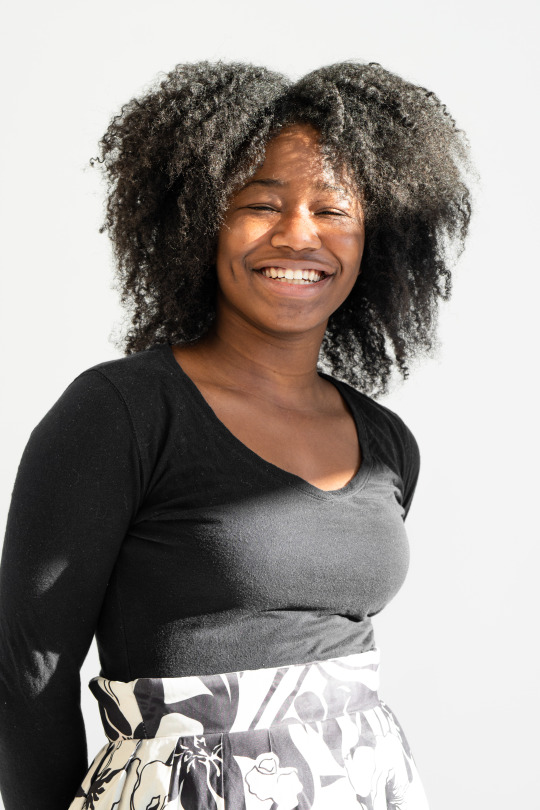
Delight Ejiaka is a graduate of Lee University from Cleveland, TN where she studied film production and English Writing. She loves stories and reviews new releases on her Instagram page to the delight of her bookish audience.
Arel Wiederholt-Kassar

Arel is from San Francisco. After studying literature at UC Santa Cruz, he worked at 826 Valencia in SF before moving to Barcelona to write and teach. His favorite fiction has long sentences and invented words. He’s excited to move to Las Vegas and get to work.
Kailee Wingo
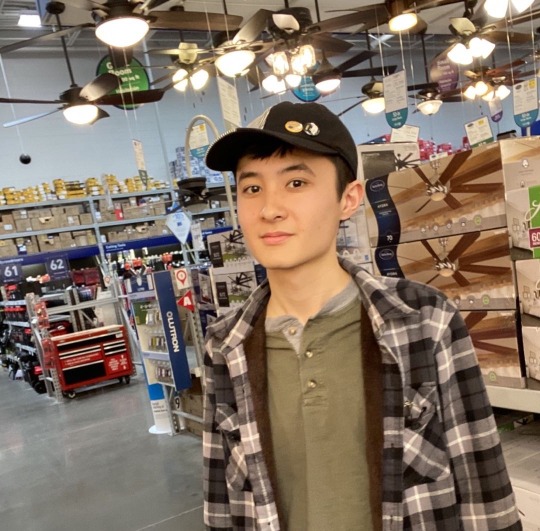
Kailee Wingo is a biracial fiction writer born and raised in Shanghai, China. I moved to California after high school to study English, Art, and Chemical Physics. Kailee’s stories are surreal, and they explore repressed personal identity and memory in a dream-like landscape. In his free time, Kailee enjoys playing indie games, painting, wheel throwing, and lampworking marbles and beads.
Poetry MFA
Jo Wallace
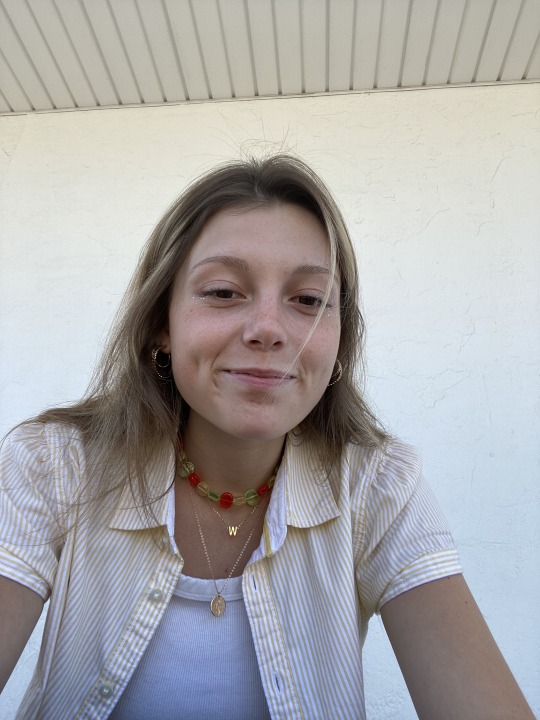
Jo Wallace is a poet from Indiana, fresh off earning their B.A. in Creative Writing, Sociology, and Communications from Purdue University. As a first-generation scholar, Jo’s work orbits topics such as poverty, addiction, mental illness, family, and intergenerational trauma, as well as reconciling the experience of these struggles while also existing in a world that somehow still leaves you in a state of constant wonder.
Leah Mell-Carrington
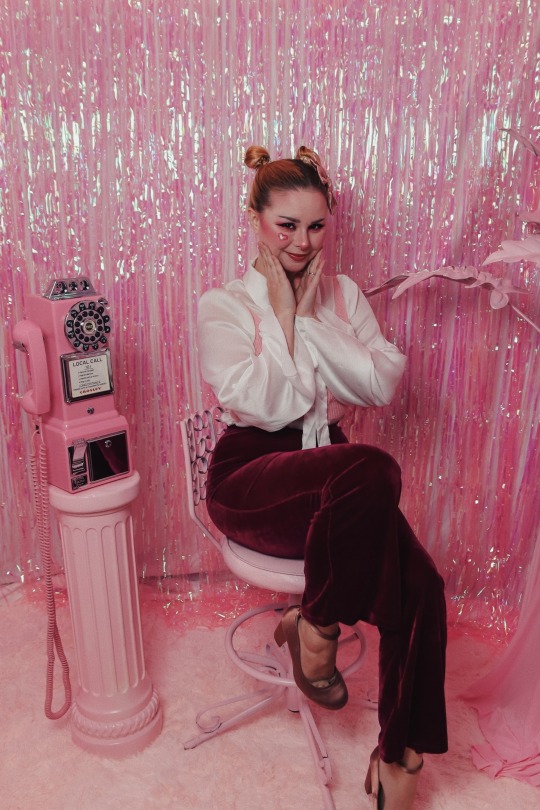
Leah (she/they) is a genderqueer lesbian poet and translator from Charlotte, NC. She graduated from Davidson College with a BA in English and Russian Language & Literature. At present, she works as a freelance poetry critic for Lunate Journal, an admin at a local community college, and moonlights as her drag alter ego Tallulah Van Dank after sundown. Her artistic obsessions lie in noir, persona, morbidity, and the queer body. Leah is fond of ghosts and the sea.
Madina Tuhbatullina

Madina Tuhbatullina is from Dashoguz, Turkmenistan. She came to the United States to study English and Creative Writing in 2017. Much of her work is about bi-cultural identity and how it affects her relationship with herself and other people. Madina is excited to join UNLV’s creative community and will be glad to teach how to pronounce her last name to anyone interested.
Benjamin Favero
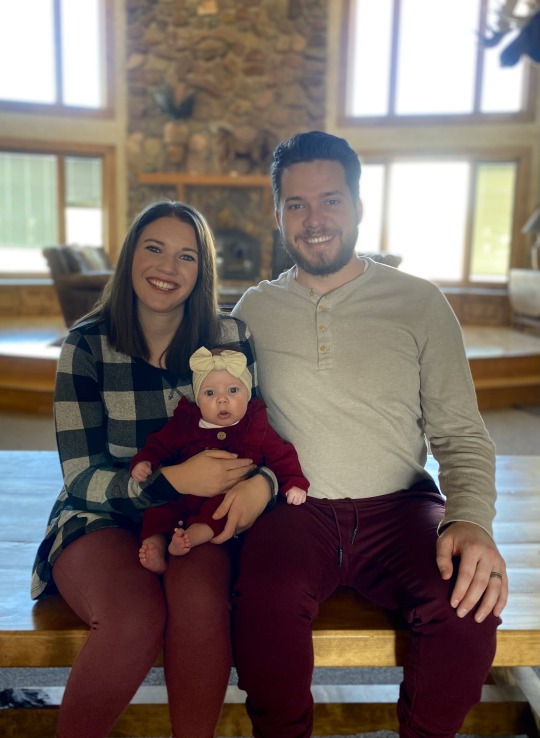
Benjamin Favero was born in Ogden, Utah where he earned his BA from Weber State University in English—Creative Writing with minors in French and Literary Editing. As new parents, Ben and his wife, Jenae, look forward to warm winters and sweltering summers in Las Vegas with their daughter Halle. On top of writing poetry, fiction and reading whatever he can get his hands on, Ben loves hiking, swimming, and playing basketball.
Non-Fiction MFA
Meg Bernhard
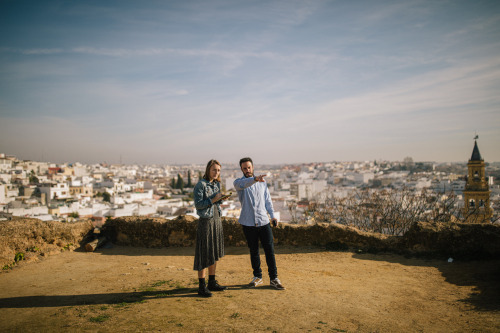
Meg Bernhard is a freelance writer and reporter from California. Between 2017 and 2020, she lived in Spain and Belgium, where she worked on vineyards and as a stringer for The Los Angeles Times. Her other work has been published in The New York Times Magazine, The New Yorker, Guernica, Harper’s, and elsewhere. Her Hazlitt essay “Water or Sky?” about a friend’s drowning and finding meaning through shared grief, was anthologized in the 2021 Best American Travel Writing edition. She loves desert pavement.
Destiny Pinder-Buckley

Destiny Pinder-Buckley was born and raised (mostly) in South Dakota. She used to hate the place, but after traveling to 34 countries, she’s come to appreciate what the Midwest has to offer. She graduated with a B.A. in English and French and often wonders if she can speak either language correctly. This fall, her personal essay “Pandemic: You Are Here” will be published in an anthology about Sioux Falls, SD by Belt Publishing.
Billy Lezra

Billy Lezra (they/them) was born and raised in Spain. They earned degrees in creative writing and global humanities from Mills College and are the co-founder and editor-in-chief of Rough Cut Press, a monthly literary journal that publishes emerging and established voices from the LGBTQIA community. Their nonfiction has appeared in The Independent, Huff Post, and elsewhere. They are intrigued and excited to move from the coast to the desert.
Chris Falite

Chris Falite hails from just outside Boston, Massachusetts. His primary focus is literary nonfiction inside the political and social arena, and he’s currently working on “a memoir of sorts.” His first book, To Whom It May Concern (an utterly warped and anxious odyssey into the psyche of American Democracy) documents his adventures as a freelance photographer during the 2020 Democratic Primary, the Coronavirus Pandemic, and the George Floyd protests. Separately, Chris enjoys doing everything and doing nothing, as long as it’s worth it. An East Coast soul through and through, he’s excited to explore the West.
2 notes
·
View notes
Text
books I’ve read in 2020 (so far) + their ratings
non-fiction
crossing the line: australia’s secret history in the timor sea by kim mcgrath: important research into australia’s theft of oil in timor leste. didn’t rate
hood feminism: notes from the women that a movement forgot by mikki kendall: essay collection dissecting modern feminism, pointing out the exclusionary practices of mainstream feminism and offering new frameworks through which feminism should operate. really recommend. didn’t rate
the uninhabitable earth: life after warming by david wallace-wells: good introduction to environmentalism and the climate disaster. a little too introductory for me but good for those new to the topic. ★★★
homo deus: a brief history of tomorrow by yuval noah harari: it is simply not Sapiens nor as good as Sapiens. Looks at potentials for our future but, thought it was a little poorly researched. Some parts were still interesting though. ★★★
SPQR: a history of ancient rome by mary beard: a little dense at times, but super interesting and detailed look at ancient rome. enjoyed it a lot. ★★★★
sister outsider by audre lorde: collection of audre lorde’s essays and speeches, about feminism, lesbianism, the queer community, being Black and a lesbian ect ect. outstanding, important collection anyone interested in intersectional feminism must read. ★★★★★
all boys aren’t blue by george m. johnson: memoir about johnson’s experiences growing up as a Black gay boy in a poor neighbourhood. Very poignant memoir, written in such accessible language which I liked. guarenteed to get you emotional, another one everyone should read. didn’t rate because it’s so highly personal that felt wrong but highly recommend.
under a biliari tree i born by alice biari smith: memoir by an Aboriginal Australian detailing her life growing up learning traditional Aboriginal ways and how the lives of Indigenous Australian’s have been impacted through the years, specifically in Western Australia. Probably more aimed at school age people but still a 101 I think many Australian’s (and non Australian’s) can benefit from. didn’t rate
classics
maurice by e.m forster: gay man coming of age story in college + themes around class and sexuality. forster’s end note saying he thought it imperative to write a happy ending because we need that in fiction, i love him. ★★★★★
emma by jane austen: read before seeing the movie. loved emma as a character but thought this was okay compared to other Austen I’ve read. ★★★½
perfume by patrick suskind: a man with an incredible sense of smell starts murdering young women to try and bottle their scent for a perfume. weirdest shit I ever read still don’t know how to feel about it. ★★★
the color purple by alice walker: follows the life of Celie, an Black woman living in rural Georgia. deals with her relationship with her sister Nettie, her lover Shug Avery, and with God. this tore my heart to shreds absolutely everyone must read it, like even just for the beautiful writing ALONE. ★★★★
a study in scarlet by arthur conan doyle: its sherlock holmes #1 no further explanation required. not my fave sherlock story, was the weird morman subplot needed? ★★½
dracula by bram stoker: yeah vampires!! this was way easier to read and also way funnier than I expected. we STAN gothic aesthetics and Miss Mina Harker here. ★★★★
fantasy
the diviners by libba bray: teens with magical powers/abilities solving mysteries in 1920′s new york. reread. ★★★★★
lair of dreams by libba bray: the diviners #2. reread. ★★★★½
before the devil breaks you by libba bray: the diviners #3. reread. best one in the series hands down. ★★★★★
the king of crows by libba bray: waited so long for this series ender and it let me down lol. ★★★
clockwork princess by cassandra clare: the infernal devices #3. dont @ me this is my comfort reread series and I was travelling. ★★★★★
we unleash the merciless storm by tehlor kay mejia: we set the dark on fire #2. latinx inspired fantasy about overthrowing a corrupt government with an f/f romance. didn’t like as much as book one but still good, BEST girlfriends ever. ★★★½
wolfsong by t.j klune: basically feral gay werewolves and witches living in a town together. feels like a teen wolf episode but way more gayer. despite that hated the writing style and I don’t like age gap romances so yay the concept no the execution. ★★
the fate of the tearling by erika johansan: the tearling #3. finally finished this series, dunno why everyone loathes the ending so much I thought it was cool. underrated fantasy because it’s very unique. ★★★★
girl, serpent, thorn by melissa bashardoust: persian inspired fantasy about a girl who is cursed by a div to kill anyone she touches. has an f/f romance. bashardoust writes the most aesthetically rich settings I love her. ★★★★
crier’s war by nina varela: reread. f/f enemies to lovers where the main character poses as a handmaiden in order to try and murder the princess whose father killed her family. PEAK gay content literally a modern classic. ★★★★★
we hunt the flame by hafsah faizal: I was so disinterested in this book I barely can describe the plot but basically it’s a prince and a hunter who are enemies but are forced to go looking for this magical artifact together anyway it was boring. ★
ghosts of the shadow market by cassandra clare + others: short story collection set in the shadowhunter world. probably the strongest of her collections but they just don’t hit the same as her full length books. didn’t rate.
a storm of swords: part two by george r.r martin: a song of ice and fire #3. I WILL finish reading these books eventually i swear !! probably the best one yet though. ★★★★
amarah by l.l mcneil: world of linaria #3. high fantasy with politics, dragons, warring races. tolkein/asoiaf vibes if they had more women with agency. didn’t rate because I haven’t decided my feelings on the end yet.
science fiction
This is How You Lose the Time War by Amal El-Mohtar and Max Gladstone: f/f enemies to lovers between spies on rival sides of a time war. good book but writing style wasn’t for me (others love this so eh take my opinion with a grain os salt: ★★★
not your sidekick by c.b lee: main character is from a superhero family but has no powers herself, so she takes an internship working with a superhero corp. has an f/f romance with a villain character. so much fun and super cute
speculative fiction:
the deep by rivers solomon: speculative fiction wherein pregnant African women thrown overboard by slave ships gave birth to babies that became mermaids. main character holds all the memories of her people’s past but runs away after being unable to deal with the burden. about self discovery, intergenerational trauma and the burden of remembering. a little short imo but still all round excellent book ★★★★
how long ‘til black future month? by n.k jemisin: short story collection, many with an afro-futurism focus. hard to explain because there is such a wide variety of stories but this is an AMAZING collection. didn’t rate because I don’t like rating short story collections but wish more people would read it.
mystery
the family upstairs by lisa jewell: woman inherits an english house and starts to unravel the secrets of a mass cult suicide that happened there years ago. loved it because it was wild. ★★★★★
the hand on the wall by maureen johnson: truly devious #3. boarding school mystery where the main character has to solve a murder that happened in the 1920s at her school while another mystery is happening in present time. my least favourite of the series but satisfying conclusion nonetheless. ★★★½
contemporary fiction
maybe in another life by taylor jenkins reid: dual timeline book showing the two outcomes of a decision the main character makes. cool concept but ultimately boring book because I didn’t care about the main character at all. didn’t rate because I didn’t finish it.
girl, woman, other by bernadine evaristo: vignette stories of various women whose lives are vaguely interconnected. incredibly well written with such vivid characters. deserves the hype. ★★★★
tin heart by shivan plozza: australian YA, the recipient of a heart transplant wishes to connect with the family of her donor, after she discovers the identity of her donor. good story but didn’t like the writing style. ★★★
a little life by hanya yanigahara: follows the life of a group of friends living in life, especially that of jude, a closed off and damaged man with a troubling past. a little too torture-porny/Tragic Gays but I cannot deny the author has a beautiful writing style and I went through all the emotions. didn’t rate
a girl like that by tanaz bhathena: explores the events leading up to the main character dying in a car crash. set in Jeddah, saudi arabia and explores expectations on women, feminism and expressions of sexuality and relationships between women during teenage years. kinda no good characters but I loved it for it’s messy depiction of teen girls (whilst not condemning them for this). underrated. ★★★★
little fires everywhere by celeste ng: drama in white american suburbs when a new family moves in and the neighbours start investigating their past. eh, I heard a lot about this and thought it was just okay. ★★★
stay gold by tobly mcsmith: trans boy decides to go stealth at his new school and falls for a cheerleader, georgia. about navigating being trans and definitely felt like it was written to educate cis people. it was okay but ultimately not my thing and not really the story I was looking for, even though I respect it being written by a trans author and still would recommend to certain people. ★★½
everything leads to you by nina lacour: main character and her best friend have to unravel a hollywood mystery, all while the main character is trying to get over her ex-girlfriend and find work as a set designer. f/f romance and loved the focus on movie making and the power of stories. ★★★½
the falling in love montage by ciara smyth: a girl meets another girl at a party, but she’s not looking to date due to the amount of family issues she has going on. so her and the girl decide to spend the summer having fun, renacting scenes from rom-coms, but never dating. awesome family dynamics and the relationship between the two girls was sweet also set in ireland which is fun.
normal people by sally rooney: explores the relationship between connell and marianne, who meet in school, date secretly, and then are inexplicably drawn to each other for the rest of their lives. explores power dynamics, relationships, love and trust, and what we owe to eachother. great book, great mini-series, love it to bits. ★★★★★
the glass hotel by emily st john mandel: impossible to explain this book, but there’s a mystery about grafitti, a ponzi scheme and a character falling to their death on a boat under suspicious circumstances. honestly idk what happened in this book but I liked it. ★★★½
historical fiction
half of a yellow sun by chimamanda ngozi adichie: historical fiction about the biafran war loosely based on adichie’s family experiences. incredibly well written with an ending that punches you in the gut. ★★★★
hamnet by maggie o’farrell: explores the shakespeare family after the death of their child, Hamnet, from the plague, and how this leads to Shakespeare writing Hamlet. cool as fuck concept and boring as fuck book with such tropey female characters. ★★
all the light we cannot see by anthony doerr: WW2 fiction, dual perspective between a blind girl living in france and a german boy forced into nazi youth. I cannot believe this book is award winning it’s so boring and predictable and i reget the time i wasted on it. ★
poetry:
on earth we’re briefly gorgeous by ocean vuong: poetry memoir. vuong writes a letter to his illiterate mother, knowing she’ll never read it, exploring their relationship, his experiences growing up as second generation Vietnamese-American, and hers during the Vietnam War. My favorite book I’ve read so far this year, just too good to explain, genuinely just feel like everyone is better off for having read this. ★★★★★
currrently reading:
girls of storm and shadow by natasha ngan
meet me at the intersection: edited by rebecca lim & ambelin kwaymullina
stamped from the beginning: the definitive history of racist ideas in america by ibram x. kendi
get a life, chloe brown by talia hibbert
#books#reading#booklr#book#book recommendation#mine#reading update#did anyone ask for this#no#did i do it anyway yes#its my continuing agenda to get book tumblr to read books that aren't soc and aftg aaldkskska#ok bye#after making this its become apparent to me I need to balance out how much fantasy I let myself read akdksks#i lov fantasy but im TRYING to read more uhh non fiction and lit fic
6 notes
·
View notes
Audio
Lavender Menace, a term first rooted in the American lesbian women’s movement for inclusion within feminism, now allows two pairs of Indigenous artists to gather, connect, and nourish each other’s growth to thrive as natural beings in ever-changing, estranged, rigid, urban environments.
Lavender Menace brings together Metis artist, Chanelle Lajoie, in mentoring ten-year-old Ella Greyeyes in photography, capturing medicine and bodies amongst varying landscapes. Lavender Menace also brings together Anishinaabe artist, Kiana Compton, in mentoring Sadie Hudson-Constant, 12 years old, in painting, referencing the natural and native elements of the nearby location. The two artists painted floral patterns and Thunderbirds directly within the developed and concrete landscape of the skatepark.
This public exhibition allows Lavender Menace to blossom with the inclusion of Indigi-queer bodies occupying space on land, space in feminism, and space in queerness. Lavender existing as medicine reflects the medicine that two-spirit, femme, non-binary, and Indigi-queer individuals embody within our homelands.
Witness our existence.
Celebrate our growth.
Heal alongside us.
The group public art exhibition, Lavender Menace, included a mentorship aspect, where two pairs of artists would meet at the skatepark, the location of the exhibition, and relating that location with being a gathering place for Indigenous and non-Indigenous people alike for millennia. The meetings included intergenerational knowledge sharing between artists and this included not only skill sharing in the mediums of photography and painting but included nature walks which connected the artists with each other, as well as to the land as Indigenous beings.
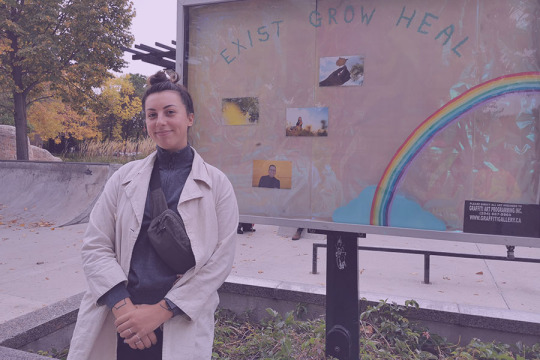
My name is Chanelle Lajoie, my pronouns are she/her, I come from here on treaty one territory, commonly known as Winnipeg Manitoba. My role in the project with Lavender Menace was a mentor to Ella in photography. I’ve been making art for as long as I can remember but what stands out most was when I participated in the youth outreach program at Martha Street Studio, and with my line of work, I would encourage participants to engage with Graffiti Art Programming. The medium I am most comfortable to work in is photography., but I’m now exploring filmmaking and I am really excited about that.

My name is Ella Greyeyes, and I go by she/her, I am from Winnipeg and my family is from Pegius. My role is a photographer, being a mentee. I started photography 2 months ago. My favourite art is mostly photography because I like picturing something and taking a photo of it and when other people see it I hope they feel happy inside.
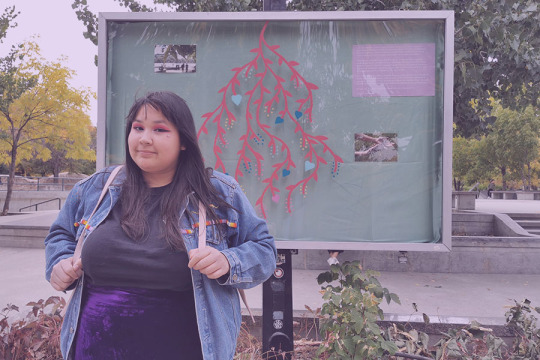
My name is Kiana Compton, I go by she/her. I am Ojibwe, Cree, and Blackfoot. My spirit name is Woman in the Heavens Standing, I work at Art City, I was born and raised in Winnipeg. I was one of the mentors, I mentored Sadie and we did the painting. My uncle, Carl used to babysit me and he lived with me at one point and he would make me do art because he was a painter. And then I was a powwow dancer growing up and we were too poor to buy regalia so my mom got us to make our own. I like painting the best, I used to be a beader but I just feel like painting is more me, it’s chill I like just listening to music and painting whatever I want.
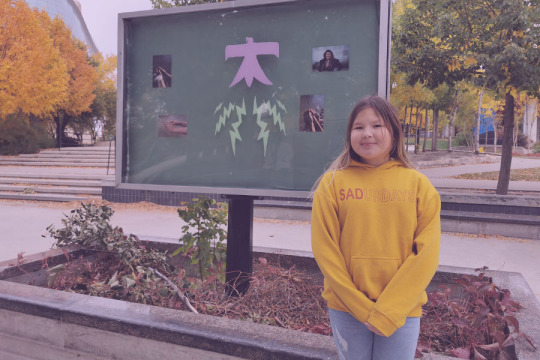
My name is Sadie Hudson-Constant, I go by she/her, my spirit name is Loud Thunderbird Woman. Born and raised in Winnipeg but my family comes from Peguis. I like to sketch a lot. I do a little bit, whenever I can. I like to sew and bead for regalias for my powwow dancing.
Annie: Lavender Menace means so many different things to different people. To each of us individually, we all come together from different upbringings, whether we are beginners, emerging, or semi-established, we have all come together to create something that gives back to our communities. It has resonated with us all differently, so for our artists, what does Lavender Menace mean to you?
Ella: Felt like I was part of the team, I felt like really happy doing this project because I just love taking photos and everybody that worked on this project was just so nice.
Kiana: I guess taking up space that's rightfully meant for us reclaiming space.
Sadie: I don't know it was really cool to be a part of this. This is the first time I got to show my art off.
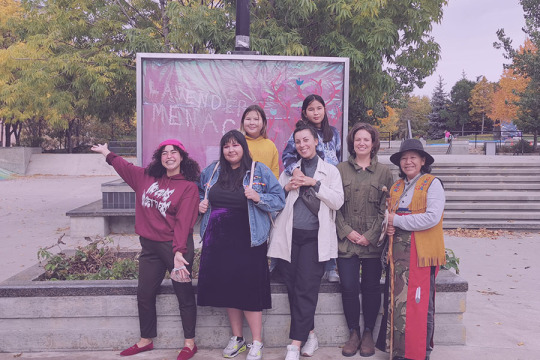
Annie: The group public art exhibition Lavender Menace included a mentorship aspect where two pairs of Indigenous artists would meet at the skatepark, the location of the exhibition, relating that location with being a gathering place for Indigenous and non-Indigenous people alike for millennia. The meaning of secluded intergenerational knowledge-sharing between artists in this not only included skill sharing in the mediums of Photography and Painting but also included nature walks, connecting the artists to each other as well as the land as Indigenous beings.
Knowing the history of this location The Forks of the Red and Assiniboine Rivers, what did it mean for our artists to be gathering, connecting, and making art, here at this location?
Chanelle: I hope that Indigi-queer folks feel regognized on lands that are inherently theirs, and I also hope that folks that do not identity as Idnigenous or Queer recognize its meant to offer space to indviduals who have been underrepresented for most of their lives here. I hope that when people are engaging with the artwork, settling into having conversations that might be challenging and understanding that those challenging conversations may mean we have to give space to these people who are on display.
Ella: I hope they feel happy inside and happy wherever they go.
Kiana: I hope they know the roots of it and that its Indigenous, Indigo-queer, and that it makes this space more inclusive to all.
Sadie: I hope they know what the Thunderbirds do, I know there are people who don’t know but it’d be really cool if they could kind of get an idea.
Annie: Yeah, and what is the idea that your Thunderbird says?
Sadie: Everytime it rains, especially around this time, it’s the time when Thunderbirds are giving Mother Earth water to heal her, so it’s not a bad thing to get those storms.

Annie: The mentorship aspect of this exhibition project played such a huge role, for all of us, learning from each other in new experiences, in new ways, and under new circumstances with social distancing. What did our artists learn from this project that they hope to apply in the future?
Chanelle: I think the number one thing that stood out to me was that the ways in which intergenerational knowledge sharing can also be a creative endeavor. I learned a lot from Ella in our mentorship as a mentor, I think I was also in the position of a mentee, and I think it’s important that we recognize and celebrate all of the important teachings that youth carry with them because they are our future and I look forward to what Ella has ahead of her.
Ella: It was mostly learning photography and both, learning to be on a team with you guys, and doing this photography thing.
Kiana: Being a mentor, usually I’m not going out there and doing my thing with the intention of being a mentor, but it is what it is. As a young person, you are going to be a mentor to other young people because they are always looking up to you and doing what you do so I guess realizing that role and continuing it.
Sadie: I learned not to be scared to go to things like this, it took away some of the anxiety I have to meet new people, so it helped me a lot.
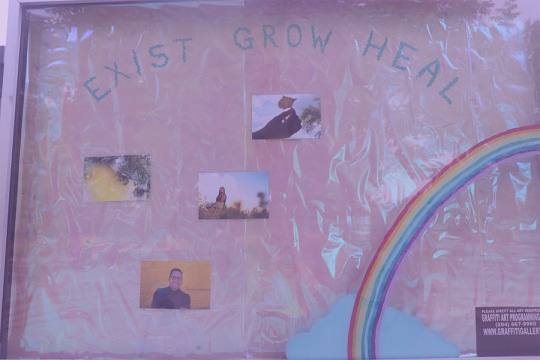
Annie: The show focused on creating an environment to allow Indigi-queer, Two-Spirit, non-binary, femme, queer individuals to thrive, to gather as community, and to take up space, in a space that has always been ours. Lajoie said the show at The Forks is meant to start a conversation about representation of Indigenous LGBT and Two-Spirit people in a space so deeply rooted in Indigenous histories.
In line with the fall solstice, the opening event of Lavender Menace took place September 20, 2020 from 5-7 at The Forks Skatepark. It was an outdoor distanced event with Queer Skate Wpg and Board Broads invited to skate. We had the Gago Brothers B-Boy Dance crew. Kilusan, Maribeth, and Tessa Chartrand as DJs, our DJ set included a live Instagram feed on Graffiti Art Programming’s Instagram account, and encouraged those who were staying home to be a part of the celebrations to encourage healthy communities. It was an open skate, participants and guest got to bring their boards, bike, blades, as well as mask, and be together to recognize and celebrate each other through art.
#Art#PublicArt#StreetArt#GraffitiArt#Indigenous#FirstNations#Metis#Healing#Indigiqueer#TwoSpirit#LGBT#Queer
4 notes
·
View notes
Text
I loved the idea of a chosen family in Tales of the City right from the beginning, and was fascinated by Mrs Madrigal. I supposed it was because I'm right now missing that kind of person in my daily life, and well, I AM missing a nice older lady to pop up and offer me a glass of wine, and listen to my sorrows, and give me wise advice.
But then I understood that Mrs Madrigal offered me a representation which validated my experience of the wise women who have been in my life, and who still are around. The validation is important because I feel that it's been hard to make some people see how important these women have been, and especially how hard it has been to lose them. I could tell you stories about my lesbian existence which still is ignored by my own mother and about an unhappy childhood when I was generally emotionally neglected. I don't know what would have become of me without these ladies (and some professional help).
My own Mrs Madrigal died when I was 12. There is a certain resemblance: later on I realized that she presumably had been a queer woman, and her life hadn't been an easy one, because of many different kind of losses. But she had lots of love for her children! Or maybe it was just because of that. I burst into tears when I once met one of her earlier children for the first time - we connected right away because, well, we were family. Another decade but the same love.
So, my very wise advice is to recognize and cherish all kinds of families and intergenerational friendships.
#tales of the city#anna madrigal#chosen family#armistead maupin#neeleys and her ladies#and btw i've been in love with olympia dukakis since steel magnolias
16 notes
·
View notes
Text
Angry Post on Oedipus
The plot of Oedipus Rex is frequently described as the working out of a curse laid upon the children of Laius, Oedipus’ father and victim. The story is familiar enough: despite Laius’ attempted infanticide, Oedipus returns to Thebes and, in ignorance of his biological parentage, kills his dad and fucks his mum. This terrible fate was ordained by the Gods, is frequently called a curse, and its inexorable revelation exposes the feckless maliciousness of the Greek deities.
Oedipus is some play: Aristotle would use it as the template for the ideal tragedy in the Poetics, its careful elaboration of Oedipus’ crimes is a masterful display of Sophocles’ skill of building dramatic tension and the final understanding of Oedipus of his own nature makes it a prototype for a horror story, in which the hero suddenly discovers that they are actually the villain. The skilful development of Oedipus ensures that the audience is drawn in and feels sympathy for the protagonist (his mother and wife, Jocasta, however, is inevitably a stock character whose death is a mere prelude to Oedipus’ blinding. So much for the female experience).
Because of Sophocles’ delicate yet inevitable description of fate finally catching up with the unfortunate monarch, the play is frequently understood as fatalistic and the curse itself a simple representation of ‘original sin’ (although the Christian term is anachronous). The fate is arbitrary, a bitter fact of a universe that doesn’t so much not give a fuck about humans but actively fuck with them. Oedipus’ peripeteia is to realise his actual nature, and he’s a mother-fucker.
Yes, that works, only it is only part of the story, isn’t it? Laius wasn’t just the victim of a curse. He was cursed because he fucked kids. He was supposed to be the tutor to Chrysippus, only he raped him and provoked the boy to suicide. The punishment, to be killed by his biological son – and to have his wife seduced by the same child – is a punishment for child-abuse. It has a bit of a gangster edge, but is clearly a moral response to criminal behaviour. Oedipus demonstrates the social and personal consequences of child-abuse: it stays around to fuck up the next generation.
And let’s just remind ourselves of the culture in fifth century Athens. Kenneth Dover’s Greek Homosexuality has a close look at the various sexual relationships enjoyed in the cradle of civilisation. Basically, he concludes that men would engage in relationships with young teenagers – at their most attractive just before puberty – because the legalistic nature of marriage (and the oppression of women, who were banished to the back of the house) meant that romantic love needed an outlet.
Contrary to some optimists, who like to believe that before Christianity, there was no homophobia, gay adult men (as far as they could be said to exist in any terms that overlap with contemporary notions of sexual identity or behaviour) were mocked and castigated. Wanting sex with a man of the same age was effeminate, and there’s plenty of jokes at the expense of such men in Aristophanes. An adult relationship between men wasn’t happening. What was okay in Athens of the fifth century was an adult male having with a child, in exchange for a few bits of educational advice.
So – to be clear: Sophocles wrote a play demonstrating the consequences of a relationship that was common in the city in which his plays were performed. It’s not just a meditation on a hostile universe (although this quality adds an apparent universality to the script). It is about how damaging paedophilia is. Of course, admitting that the same men who invented democracy and equality before the law (isonomia, the principle that led to democracy) were involved in something like a paedophile ring is upsetting, so that gets ignored. And pointing to the treatment given to adult men attracted to other men, it’s a homophobic one, too.
The amount of evidence that Dover marshals for the prevalence of pederasty suggests that they were doing a fair job of making it seem acceptable. And even a classicist like Dover, who must have known that the word ‘homosexual’ was not even invented until Karl-Maria Benkert coined it in 1869 (Havelock Ellis was like, it’s a ‘barbarous… monstrous mingling of Greek and Latin’ (Studies in the Psychology of Sex, Vol. II, 1921)), uses it to describe behaviour that is better described as kiddy-fiddling. Congratulations on forging a link between the healthy desire of adult men for each other and systemic abuses of power.
I have two points here. One is that there is a further reading of Oedipus that is probably discussed in some classical scholarship but not generally known that makes the play fiercely moral and more connected to its specific historical genesis than the typical ‘it’s a universal play’ or ‘it’s about a subconscious desire all men have to sleep with their mum’. It doesn’t replace those readings, but it adds a layer.
My other point is that the conflation of homosexuality and paedophilia, which is bullshit and still hangs about in conservative homophobia, has one hell of a pedigree and is enforced by respectable sources that misapply the terms. I first discovered Laius’s antics in an encyclopedia of queer mythology, which coyly tries to reclaim Laius within some kind of hidden history. Apart from suggesting I didn’t pay much attention when I studied Classics at St Andrews, this is supposed to be a queer positive handbook revealing the occluded queerness of mythology and that. I know I shouldn’t have faith in a book that discusses William Burroughs without mentioning heroin use, or has a longer section on astrology than Islam or Christianity (it’s bullshit mysticism), but the need to discover lost heroes doesn’t necessarily involving adding to the long list of attempts to misunderstand the simple fact that paedophilia is not homosexuality.
Add that next to Peter Ackroyd’s description of pederasty as a queer sexuality in Queer City, or the mistranslations of St Paul that assume his prohibitions on fucking kids are a general message against same-sex desire (he can’t have had a thing against homosexuality because, remember, the word wasn’t invented until the nineteenth century), and there’s a nice historical context for that big load of Daily Mail paranoia.
I think I need to make this clear. Homosexuality is a manifestation of same-sex desire, an orientation. Paedophilia is rape that is predicated on the replacement of compassion with a drive to dominate. A paedophile ring is a group of criminals enabling each other, a bit like the Involuntary Celibate communities online. I am tired of the homophobia that conflates them, especially in books that are supposed to be all about liberating queerness from oppression.
I am aware that intergenerational relationships do have a pedigree within recent gay society, but if the law is able to recognise equality for the age of consent, so can chicken-hawks. There's a long tradition of an older lover introducing a younger person to the intricacies of sexual desire and intimacy, which goes into heterosexuality as well, but informed consent needs to be part of that. Children have trouble with giving informed consent.
Oh yeah, and Ackroyd: there is no reason to think that female gladiators are lesbians. No reason not to, sure, but skeletal remains with no inscription don’t tend to have a sexual identity. And you might want to interrogate what the word sodomy means in medieval society before assuming it is all about anal sex. It’s not that Christianity hasn’t got a problem with homophobia, but a bit of context might provide some clues as how to disentangle a decidedly Unchristian attitude from the prejudices of fundamentalists.
Just saying.
from the vileblog https://ift.tt/2MCEa26
2 notes
·
View notes
Text
A league of their own makes me so crazy because at its heart is about remembering the existence and struggle and joy of queer and BIPOC in a history that has always sought to erase and minimise that. From the very beginning you can see respectability politics in full play. These girls may be able to play baseball, but they must be palatable. Greta nails it when she says “It’s to make sure that we’re not queer” I can watch a woman play baseball not one that is too ethnic or too masculine because that would be too much of a subversion of white cishet normativity.
Greta knows that being white femme and pretty gives her a privilege and a safety that not every lesbian gets. But you can see in her rules and how she speaks about her past relationships, she is acutely aware of the limits of her privilege and how it won’t extend to others. So she has rules. Be seen on the arms of men. Enjoy the brief moments of genuine joy and love she shares with the women she connects with. But she doesn’t look down or say she’s like the other masc butches! Her friendship with Jo is so refreshing! I was so worried that we would get a love triangle but Jo is just concerned that Greta will get hurt again. Carson doesn’t feel threatened by Jo or asks her to choose. Jo is a staggeringly cocky, fat butch, with no intention of being desirable for the male gaze. It’s not a surprise to see how she is treated by the police. I think amongst all the violent homophobia from this period, we are reminded of the queer solidarity. Even in the finale with Jo hurting herself, even though it’s the final and how badly the Carson/Greta/the Peaches want to win, they recognise that although they had to fight to get a seat at the table, a rising tide uplifts all. Even so with that statement, Max’s story provides a stark reminder of the limits of that time and time again how BIPOC will always have to fight twice as hard.
Max is turned away at the trials, and we want to see her push and get onto the field and through the power of ✨determination✨ overcome racism to join the All-Americans. It’s a familiar narrative that I think that puts the onus on individuals like Max to put herself in actual danger, and Clance having to remind her of that. I’m glad that ALOTO didn’t do that. Max has her own storyline, faces her own hurdles to be recognised in her own community, to step outside the roles that her mother and her peers put on her. She faces the same sexism from the Screws to be recognised as talented as the Peaches do, but there is an added element. Carson isn’t Max’s white saviour. It’s another queer black woman who makes the space for Max. “All my life I fought for scraps. Damn that girl could take it all away from me. Then I realised, you weren’t doing the one taking”. It’s a rare storyline of people of colour not wanting entry into “white” spaces but a desire to make and thrive in their own as well. Max’s relationship with her mother is such a familiar and heartbreaking tale of intergenerational trauma. Although by the end we are able to simultaneously understand that while Maybelle so entirely motivated by what she sees as concern, as wanting to protect her daughter from a patriarchal and white supremacist society and at the same time, that this has not justified how she treated Max. We understand why she acts like that but we don’t see it as correct.
AND Uncle Bertie’s story was so just. What we need to see more of!!! So many people say “oh being non-binary and trans is a new phenomenon” chose to forget they have created the circumstances in which people have had to hide this in the past. The family members that were never heard of “for some reason” or who were “unwell” and only talked about in whispers. Black queer, esp trans, history in America is so established and the stories and the LANGUAGE (stud!!!!).We just never hear of them, because they are beaten into submission or written out of history or lived married lines on paper. A lot of the queer characters in ALOTO are married to men, which is a prudent safety net that often allows characters the true freedom they would like rather than a contraindication of their queerness. I think the part that really got me with Bertie was when returns and tells Maybelle that she was the reason he left, you realise that it is not that she is overtly homophobic, she desperately wants her family to be safe but cannot fathom the real danger of denying one’s own identity. Maybelle doesn’t get a redeeming plot line. We don’t need one because we have a nuanced representation of dynamics of being queer and being people of colour and intergenerational trauma and historical racism. And some baseball as well I guess.
Maybe if I loved a league of their own less, I would be able to talk about it more
6 notes
·
View notes
Note
Hi, I wanted to ask if you have any advice on how I can find more lesbians around me as a 17 year old (so a minor) and I live in a red very religious state.
I often feel so isolated as a lesbian from my peers who aren’t lesbians, I know a few lesbians but I really want to know more. Since I’m 17 I don’t have the option of dating apps, or some Facebook groups unfortunately. It’s been hard because there’s been multiple times where I resorted to talking to lesbians much older than me due to feeling like my dating poll is so small, and being lonely. I know this is bad, and I don’t want to do that cause I know it is just me being taken advantage of— but sometimes it feels like the only thing I can do. If you have any advice, I’d appreciate it so so much. I love your page and your advice♥️
It is hard as a minor to stay safe and still use the internet to reach out to find other lesbians. Continue to be safe and skepical of strangers.
FInd out if your local library has book clubs and if they support them get help starting a lesbian book club for intergenerational lesbians. This is public and safe and meet only in the confines of the library. The books give you topics to talk about to take off the awkwardness of meeting new people and you can set the demographics to your age or to a wide range.
At 17 you can still often volunteer for local prides, PFLAGS or at other LGBT non profits and they are usually very good about vetting others. HOWEVER if anyone pushes your boundaries or makes you feel uncomfortable report that to the board or the national affiliates right away.
Look on instagram or tumblr for Lesbian zines that are available. These are often produced by the younger crowd and can be free on line or very cheap and they can give you some connections to others around your range of age and shared experiences.
CHeck the meet up app for lesbian gatherings held in public places like coffee shops or small cafes. Reach out to see if they allow 17 yo and if others your age attend. Many older lesbians have neices, daughters, god daughters who are lesbians and attend these kind of casual gathering.
Check on line for lesbian archives (like at a local university or museum) and inquire about volunteering. They are great places to learn untaught history and meet lesbians of all ages who are passionate about preserving and passing on knowledge.
I hope some of these ideas help. Hang in there. You are by no means alone
29 notes
·
View notes
Text
And here’s the FFV version of the meme I’m sure no one will ask me about. This includes characters who were technically bit npcs (that one joke pirate in love with Faris, the queen of Karnak) but had little in the way of characterization apart from a few lines and tantalizing hints in the books.
Fun fact: I’ve had these OCs for 20+ year and am reusing them for Dragondance and other current FFV works, but they’ve gotten a bit of a modern polish now--Ridha is no longer related as closely to canon characters, Ben’s interest in Faris wanes because he’s gay and Faris says she’s a woman, Yllesia Karnak is now Polymja Yllesia Karnak and a bit more hot-headed than she used to be due to some statements from the books.
* Note: because Ridha is intersex and nonbinary, and always has been, their pronouns are often fluid. Usually I’ll use they/them, but also he/him. I should note, for the internet concern trolls, that not all intersex people identify as nonbinary, and not all nonbinary people are intersex. Ridha just hates being pressured to conform one way or the other, especially given who his parent originally was before I realized how fucking mary sue that was.
What OC has the biggest family? How do they get along? Polymja has a Habsburg-grade extended family, which she doesn’t always get along with. The one exception is Lenna, whom she adores.
What OC has/is a mentor? Expecting any of these people to be mentor-grade is a tall order. Ben’s fairly good at being quartermaster, though, so he might work out as one. Ridha, being a young cousin on the Highwind side, wants to be a dragon scholar for a family that lost all its dragons and most of what they can do is lecture from books they absorbed.
What OC has a huge group of friends? Ben is probably the friendliest of them, which makes him great quartermaster material.
What OC has a small, close group of friends? Ridha gets on best with smaller groups of people and would be at home in the Ancient Library
What OC has, like, one friend? Polymja is a queen who had to fight sexism to get her way and is not very inclined to trust people.
What OC is the Mom Friend? Ben, haha.
What OC really needs the Mom Friend around? Ridha, being a young teen in a family that mostly went insane after the Dragon War slaughtered the dragons 50 years before, could really use anyone attentive. So, naturally, they cling to Lenna once Lenna adopts them.
Which OCs are an old married couple (literally or figuratively)? I’m cackling over any of them being with each other. Ben’s gay, Polymja’s lesbian, Ridha is still trying to figure themselves out, and Merrick hates everyone and is old enough to be Ben’s father.
What is your favorite platonic relationship between your OCs? None of them are really that connected.
What is your favorite familial relationship between your OCs? Given that Ben was Ridha’s father in the original, um... that, I guess? But they barely know each other in the revamp.
What is your favorite romantic relationship between your OCs? None of them is ever going to be into each other.
Which two OCs are the most different from each other? Polymja and Ben. Polymja likes to go her own way, Ben is always going to be a quartermaster at heart and think of himself as one of the crew.
Which OCs complement each other the best? Given that Ben used to be Ridha’s dad, er... them, I guess.
Which OCs get along the best with each other? Ironically, given that Merrick often borders on being a cantankerous bastard at the best of times, that would work well with Polymja’s distrust of everyone who isn’t family. However, they’ve never even met.
Whch OCs get along the worst with each other? Merrick is such a crotchety old pirate captain that he would never get on with Ridha, who’s largely independent.
Which OCs don’t know each other, but would get along great if they did? Polymja and Merrick. They’d appreciate each other’s distrust.
Which OCs don’t know each other, but would hate each other if they did? tbh they all have better things to worry about.
Which OCs would make the worst couple? Not to worry, they’re all such different ages and orientations that it won’t happen.
What’s the strangest way two (or more) OCs have met? The only two to have actually met are Ben and Merrick, and Ben was a deck hand on Merrick’s ship up until Merrick had a heart attack. My OCs tend to serve the story.
Which non-related OCs have known each other the longest? Ben and Merrick
Which OCs knew each other the shortest time before becoming close friends? New version: Ben meets Ridha postgame and kinda adopts him
Which OCs spend the most time together? Ben worked on Merrick’s ship for about 10 years
Which OCs have fought with each other the most? None, really? Of the two that actually knew each other for very long, Ben knew his place on the ship and it was to follow the captain’s orders, and Merrick was the captain.
Do any OCs have friends they haven’t met in person? Pre-internet society. Nope.
Do any OCs have imaginary friends? Except for Ridha, they’re all adults
Does OC have a hard or easy time making friends? Ben has the easiest time making friends because he knows he has to go along to get along.
How did OC meet their best friend? A nice lady in Tule told Merrick that Faris needed a companion her age, and Merrick’s pilot had an available nephew. And yeah, 5-year-old Faris did not want a babysitter, but she and Ben did get to be friends eventually.
How did OC meet their worst enemy? King Gelon of Tycoon decided to marry his daughter off to some country bumpkin instead of Polymja, who was princess of Karnak at the time. She met Alexander during the meeting over how to punish Gelon for conquering Walse and disliked him for being chosen to marry her crush since.
How did OC meet their significant other? If OC does not have a SO, do they want one? Merrick met his husband in a pub brawl over... who even knows anymore.
How does OC get along with their parents? Version 1 Ridha worshiped his parents. Version 2 doesn’t get the parenting he needs, so he latches to his cousin Lenna.
Does OC have siblings? Do they get along if they do? Do they wish they had some if they don’t? Merrick lost his much-loved siblings in the conquest of Carwen by Gelon Tycoon and has hated the royal family since. Polymja used to have a brother she didn’t like very much, but he died of mysterious circumstances (mysterious as in: please look up Charles II of Spain, because I find the Habsburgs fascinating in a trainwreck way)
Does OC have or want kids? Ben might want kids, but he’d have to adopt. Merrick considered Faris his child and gloated over the fact that he managed to steal a child of Tycoon and claim her as his own.
Is OC/Would OC be a good parent? Ben would actually be a great dad.
What is something unusual OC has bonded with someone over? Polymja encouraged Lenna’s tomboy streak as a child, as she was one herself
What is the most important relationship in OC’s life? Merrick actually did get to become slightly less of an asshole with Faris in his life. Something about having responsibility for someone who had no options.
How has OC been affected by their friendships? The only reason Karnak and Tycoon got along at all was because Polymja was willing to set aside her animosity with Alexander for the sake of his wife and their daughters. Maybe Polymja may have never consummated her love for Lessandra Tycoon, but they were always very close before Lessandra died of complications from Habsburging.
How has OC been affected by their family relationships? Ridha vs2′s parents being distant because intergenerational war trauma is a hell of a thing, they’re a very private person and has trouble trusting people until they’ve proven themselves.
How has OC been affected by their romantic relationship(s) or lack thereof? Ben’s love for Faris is, yes, a running gag in the game. But even after it fades, he’s still a loyal friend and will follow her to the ends of the earth.
Who does OC consider they have learned their most important life lesson from? Merrick learned not to be such a bastard from Faris, so there’s that. He might blame her family for his family’s death, but she had nothing to do with it.
Who motivates OC? Lenna moves Ridha to open up and accept people into his life
Who would OC do anything for? Polymja would have done anything for Lessandra. She will do anything for Lessandra’s daughters, Lenna and Faris.
Who would OC do anything to not have to deal with? Merrick wants absolutely nothing to do with any sort of royalty, thank you. Royalty’s nothing but trouble.
How does OC meet most people? Generally, Merrick meets them either in a pub or when he’s boarding their ships to assess his winnings.
How long does it take OC to open up to people? Most of them, very slowly. They’ve all got a bit of trauma, but Ben is probably the quickest to open up because he recognizes the need for community.
How much do OC’s friends know about their private life? Merrick kept the fact that he was a trans man to himself, his husband, and Faris. That’s it. When he died, Faris took charge of dressing the body to keep anyone from finding out.
How does OC act differently after they know someone better? Ridha can be very talkative and friendly when they finally get to open up with someone. Ask them about the Highwind clan’s dragon lore and they’ll go on for hours.
Who is OC’s favorite person? Lenna is Ridha’s favorite person, because she’s so sweet to them and gives them the attention a teenager really needs from a parental figure.
Who is OC’s least favorite person? Polymja absolutely loathes the king of Walse for being a little shit when they were kids and dismissing her love for Lessandra as something she’ll grow out of once she finds a man. Actually, the quickest way to get on her shitlist is to ignore that she’s a lesbian and suggest she find a man.
Is there anyone OC used to be very close to, but no longer is? Polymja and Faris used to have a whirlwind affair that died quickly.
What aspects of OC have, consciously or unconsciously, come from someone else? Ben gets his ability to stand up for himself from Faris’ frequent adolescent clashes with Merrick.
0 notes
Text
tongue breaks inhaling
Script for performance at CCA Glasgow, February 2019. With many thanks to Angelica Falkeling, Anna Frei, Clara J:son Borg, and Raluca Croitoru.
THE END OF THE WORLD (KATHERINE)
There was an idea here of a fictional future, one that imagines a different kind of life.
There was that time in Athens thinking about how one plus one equals many things and a plus b does not equal c or d or anything simple and straightforward. The thing that struck me was the relationship to time, how the rocks were present in modernity making modernity itself be just a blip, a temporary reality, nothing more. But those rocks signified something else, they signified the beginning of modernity’s love affair with itself, the foundations of white privilege, the recasts of statues white and uncoloured denying the truth of their making time, communities accommodating difference around places that are now separated as Africa, middle east, europe. Communities of fascists situating their power in the past, a divine right to make whiteness out of Black death, Jewish death, Roma death, sometimes a while ago Italian death, Portuguese death, Irish death. A female politician being punched on live tv by a member of a fascist group, nuanced strategies to tackle domestic violence, pragmatic and magical approaches to crisis, her dad who can’t afford his health insurance and self medicates with the gym until the pain is too much, people with stuff and no money, people with no stuff and no money, international education, discrimination in the north, being paid less than minimum wage in London,
I finally read ‘Woman on the Edge of Time’ in 2017, I knew it from Emilia who helped make this performance what it is today in their role as a friend and their role with Collective Text.
In Marge Piercy’s book she writes of a future where things are decided communally, where the earth is a respected and loved and cared for host, where work is shared according to ability, child care is de-gendered and genetics are shared, difference is valued and appreciated, pleasure is had, struggles continue, empathy and awareness of the body’s capacities are high, colonial reparations have been paid, resources are not expropriated, when people cannot get on they are asked to talk until they find something, anything, they have in common. A book of small details, a future interspersed with a 1970s present where structural inequality forces poverty, violence, forced infertility, and psychiatric pathologisation of resistance onto the character. In the end, to fight to make the future happen she loses her sensitivities, has to cut off her pleasurable possibilities of travelling to the future. Time is entangled not linear.
I can’t write a fiction now because it isn’t true. I think it would be dishonest. I’m not sure if a white European person can write visionary fiction or if her attention is better allocated to acknowledging historical and present realities. Decolonisation happens in stages—critiquing the structures, imagining others, making change—and maybe I wanted to jump some. The last remaining rescue boat in the Mediterranean just had its flag removed, likely after Italian government pressure on Panama. EU money has been spent on detention centres in Libya where detainees are tortured. Insect societies have collapsed in the changing temperatures and pesticide induced soil sterility.
But I did want to imagine a present with some different turns in the past.
What happens in this story? Four women are invoked across time. Four women meet. Here. Somehow. Or do they need to when they can affect each other across the distance of time without simultaneously existing in similar forms—with you in particles if not mass—having been breathed out.
I only just realised the connection between the past and present that a perfect tense signifies in grammar. Pasts have consequences. In relationships, trauma and joy and previous life manifests. Across generations even. My body is impacted by your previous behaviours. Your body is impacted and constructed by my present and previous behaviours. I exist because you starved. I exist because they were killed. We exist temporarily in this mess, my bones made from cosmic material brought to earth on a comet, my body either a form of carbon capture or carbon release depending on burial or cremation, and what kind of coffin I might get. My body borrowed on borrowed time, owing to everyone and everything else.
What would it be to be so vulnerable? What would it be to be so supported? What would it be to feel me feeling you and to be okay with the momentary understanding that comes in a glance and the lifelong misunderstanding that comes in a culture.
What kinds of sensitivity might be expected, might be appreciated, might be valued?
What ways of knowing?
SAPPHO (RALUCA)
Sweetbitter mythweaver.
Making her own language, finding words to sing about female solidarity and friendship and sex and intimacy and care as being together, and not being commoditized. An ambiguity of language too complex for later scholars needing to define her as lesbian or not lesbian, the simplifying of structures of living and feeling that we don’t imagine, the same words she made coming to a patriarchal use meaning non-married female lover of a married man.
She comes to us through citation in treatises on grammar or style. She exists in other peoples’ paraphrasing although her work is the substance of memory. The structuring forms being grammar and rhythm, she would break the rules of the grammar to fit the rhythm, change the sounds of the words, make elisions, contractions, cuts and edits where certain moments of material could be held between the audience and the people singing the line, notes bending, material stretching, the whole being considered always and the parts adapting. I move you move we move. Talking and seeing the constellation of your thoughts makes mine move and they’re all flying around changing, being changed. Changing, fusing, and fragmenting.
Distress causes the tongue to break.
On this ground we are walking.
MARIA (CLARA)
I could only reach her by touching her work that time and she’s far away in the just-pre-internet graveyard of the female-unwritten-about so here’s a story of ears and hands, listening and touching.
If they’re both there, are they both being touched? Could they sleep like that?
Like that one time you slept in a bed with someone and you both held each other and woke in the same position as when you fell asleep. Would that be possible with the ears?
End of the world for night, resting the organ that can’t stop sensing. Give it some rest with those hands. Tiny massage points. A special kind of cartilage, flesh in between the densities of hard and soft.
If it was just the ears and they were the whole body they could hold each other maybe?
But the pleasure is also in the hand that holds. A handle like on a climbing wall. A shape made for the human hand to feel good holding it and one it can hold in sex and in non sex like when you gave me massage in a sad time and I never had someone who wasn’t a lover touch them like that. You hear me?
MELINA (ANGELICA)
imagine there weren’t the same types of shyness
what would the future look like then?
the same types of shame
shame of being ashamed
of intergenerational shame
shyness as vanity they say
shyness as fear of losing whatever power you have
shyness as downgrading whatever capacities you have
shyness as a refusal to take a risk
shyness as a necessary safety device for one exposed to unsafety
shyness as internalisation of the feeling of being wrong
having the wrong body, the wrong ideas, the wrong intelligence,
the wrong interests that comes from perhaps a fear of conflict
perhaps too much prior conflict
LENA (ANNA)
She and we are made of time. The geological time that records the actions of all the ancestors into the ice.
ENTANGLEMENT (ALL)
Being breathed out, having been breathed out, inhaling, breaks
0 notes